商务英语阅读自考大纲
- 格式:doc
- 大小:657.98 KB
- 文档页数:44
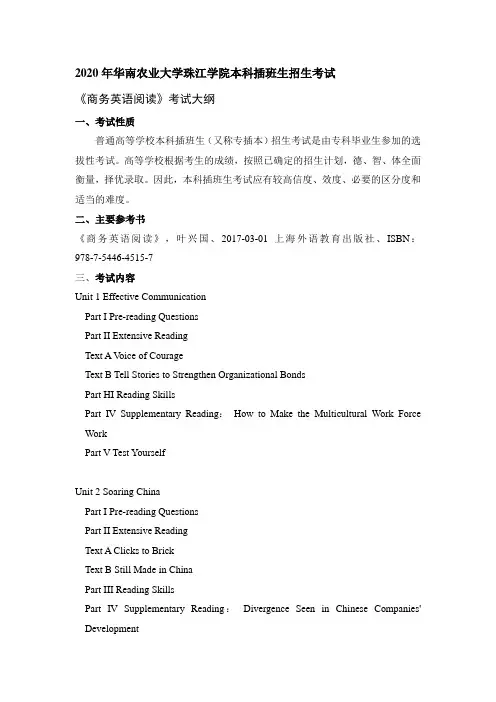
2020年华南农业大学珠江学院本科插班生招生考试《商务英语阅读》考试大纲一、考试性质普通高等学校本科插班生(又称专插本)招生考试是由专科毕业生参加的选拔性考试。
高等学校根据考生的成绩,按照已确定的招生计划,德、智、体全面衡量,择优录取。
因此,本科插班生考试应有较高信度、效度、必要的区分度和适当的难度。
二、主要参考书《商务英语阅读》,叶兴国、2017-03-01上海外语教育出版社、ISBN:978-7-5446-4515-7三、考试内容Unit 1 Effective CommunicationPart I Pre-reading QuestionsPart II Extensive ReadingText A V oice of CourageText B Tell Stories to Strengthen Organizational BondsPart HI Reading SkillsPart IV Supplementary Reading:How to Make the Multicultural Work Force WorkPart V Test YourselfUnit 2 Soaring ChinaPart I Pre-reading QuestionsPart II Extensive ReadingText A Clicks to BrickText B Still Made in ChinaPart III Reading SkillsPart IV Supplementary Reading:Divergence Seen in Chinese Companies' DevelopmentPart V Test YourselfUnit 3 Gender DiscrepancyPart I Pre-reading QuestionsPart II Extensive.ReadingText A Home Truths about Working FamiliesText B The Weaker SexPart III Reading SkillsPart IV Supplementary Reading:Humor MePart V Test YourselfUnit 4 Staff ManagementPart I Pre-reading QuestionsPart II Extensive ReadingText A Handle Your Men in the OfficeText B Seven Useful Lessons You Can Learn from a Bad BossPart III Reading SkillsPart IV Supplementary Reading:The New International Style of Management Part V Test YourselfUnit 5 Consumer BehaviorPart I Pre-reading QuestionsPart II Extensive ReadingText A The Rich Can Learn from the Poor about How to Be FrugalText B Here's How to Crack the Code on Your Customers' BehaviorPart III Reading SkillsPart IV Supplementary Reading:How Consumers Rewrote the Old Recessionary RulesPart V Test YourselfUnit 6 Marriage IssuesPart I Pre-reading QuestionsPart II Extensive ReadingText A Three Views of MarriageText B Married,with MoneyPart III Reading SkillsPart IV Supplementary Reading:Yours,Mine & MinePart V Test YourselfUnit 7 Corporate Social ResponsibilityPart I Pre-reading QuestionsPart II Extensive ReadingText A What Businesses Owe the World:Then and NowText B Don't Put People Before ProfitsPart III Reading SkillsPart IV Supplementary Reading:Social Saints,Fiscal Fiends Part V Test YourselfUnit 8 Career SuccessPart I Pre-reading QuestionsPart II Extensive ReadingText A Brain-twisting Job Interview Questions by Microsoft Text B It's Time for a Brand New YouPart III Reading SkillsPart IV Supplementary Reading:Why Can't You Find a Job?Part V Test YourselfUnit 9 Positive AttitudesPart I Pre-reading QuestionsPart II Extensive ReadingText A Be Happy 'Cause I Choose HappinessText B If You Fire People,Don't Be a Jerk about ItPart III Reading SkillsPart IV Supplementary Reading:Positive ThinkersPart V Test YourselfUnit 10 Out-of-the-box ThinkingPart I Pre-reading QuestionsPart II Extensive ReadingText A How Fast Can You Learn?Text B Student TeachersPart III Reading SkillsPart IV Supplementary Reading:Got ideas?Part V Test YourselfUnit 11 Time ManagementPart I Pre-reading QuestionsPart II Extensive ReadingText A 20 Ways to Save 20 MinutesText B How Much Time Should CEOs Devote to Customers?Part III Reading SkillsPart IV Supplementary Reading:Time Management in the Age of Social Media Part V Test YourselfUnit 12 Green BusinessPart I Pre-reading QuestionsPart II Extensive ReadingText A Succeeding as a "Green" BusinessText B The Wellness BoomPart III Reading SkillsPart IV Supplementary Reading:Recycle,Reuse,Reprofit:Startups Try to Make Money Selling Your StuffPart V Test YourselfUnit 13 Honesty IssuesPart I Pre-reading QuestionsPart II Extensive ReadingText A In Search of HonestyText B 5 Ways to Spot a LiarPart III Reading SkillsPart IV Supplementary Reading:Slasher AttackPart V Test YourselfUnit 14 Ways of InvestmentPart I Pre-reading QuestionsPart II Extensive ReadingText A Ways to Keep More CashText B When Stocks Tank,Some Investors Stampedeto AlpacasPart III Reading SkillsPart IV Supplementary Reading:Get the Right Coverage Part V Test YourselfUnit 15 Retirement PlanningPart I Pre-reading QuestionsPart II Extensive ReadingText A How Long Will You Live?Text B Plan Ahead to Beat Retirement BluesPart III Reading SkillsPart IV Supplementary Reading:Over 60 and OverlookedPart V Test YourselfUnit 16 Era of Big DataPart I Pre-reading QuestionsPart II Extensive ReadingText A The Second Age of ReasonText B Mass Individualism Makes Life Tough forConsumer Product GiantsPart III Reading SkillsPart IV Supplementary Reading:Computer Chips and DipPart V Test Yourself四、考核形式(一)考核方法考核类型:闭卷考核方式:笔试考核时间:120分钟(二)成绩评定实行百分制,满分:100分。
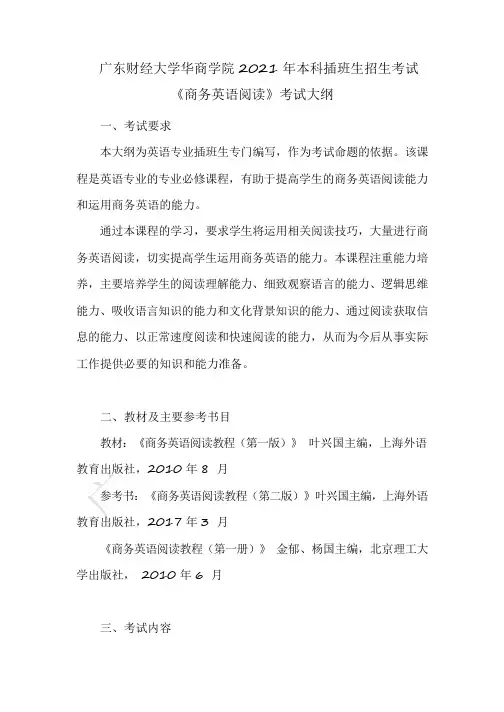
广东财经大学华商学院2021年本科插班生招生考试《商务英语阅读》考试大纲一、考试要求本大纲为英语专业插班生专门编写,作为考试命题的依据。
该课程是英语专业的专业必修课程,有助于提高学生的商务英语阅读能力和运用商务英语的能力。
通过本课程的学习,要求学生将运用相关阅读技巧,大量进行商务英语阅读,切实提高学生运用商务英语的能力。
本课程注重能力培养,主要培养学生的阅读理解能力、细致观察语言的能力、逻辑思维能力、吸收语言知识的能力和文化背景知识的能力、通过阅读获取信息的能力、以正常速度阅读和快速阅读的能力,从而为今后从事实际工作提供必要的知识和能力准备。
二、教材及主要参考书目教材:《商务英语阅读教程(第一版)》叶兴国主编,上海外语教育出版社,2010年8月参考书:《商务英语阅读教程(第二版)》叶兴国主编,上海外语教育出版社,2017年3月《商务英语阅读教程(第一册)》金郁、杨国主编,北京理工大学出版社,2010年6月三、考试内容Unit 1Part II Extensive ReadingText A The New International Style of ManagementText B New Thinking for Successful EntrepreneursPart IV Supplementary Reading: New Thinking for a New Financial OrderUnit 2Part II Extensive ReadingText A How Fast Can You Learn?Text B Student TeachersPart IV Supplementary Reading: Learn to Work with the "Now"Unit 3Part II Extensive ReadingText A If you Fire people, Don't Be a Jerk About itText B Why Can't You Find a Job?Part IV Supplementary Reading: They were once ExecutivesUnit 4Part II Extensive ReadingText A Brain-twisting Job Interview Questions by MicrosoftText B It’s Time for a Brand New YouPart IV Supplementary Reading: Today’s Hottest Product? You!Unit 5Part II Extensive ReadingText A Ways to Keep More CashText B When Stocks Tank, Some Investors Stampede to Alpacas Part IV Supplementary Reading: On Breaking RulesUnit 6Part II Extensive ReadingText A Got Ideas?Text B Seven Useful Lessons You Can Learn from a Bad Boss Part IV Supplementary Reading: Efficiency vs. EffectivenessUnit 7Part II Extensive ReadingText A The End of E-MallText B The Disruptive Power of NetworksPart IV Supplementary Reading: Who Killed the Newspaper?Unit 8Part II Extensive ReadingText A How Long Will You Live?Text B Plan Ahead to Beat Retirement BluesPart IV Supplementary Reading: Over 60 and OverlookedUnit 9Part II Extensive ReadingText A Voice of CourageText B Tell Stories to Strengthen Organizational BondsPart IV Supplementary Reading: Home Truths About Working FamiliesUnit 10Part II Extensive ReadingText A Be Happy 'Cause I Choose HappinessText B Humour MePart IV Supplementary Reading: Come Out and Play四、考试方式与试题类型1、考试方式:闭卷,时间为120分钟2、试题类型:单选题、判断题、填空题、翻译题3、试卷安排:(1)本大纲各章所提到的内容和考核目标都是考试内容。
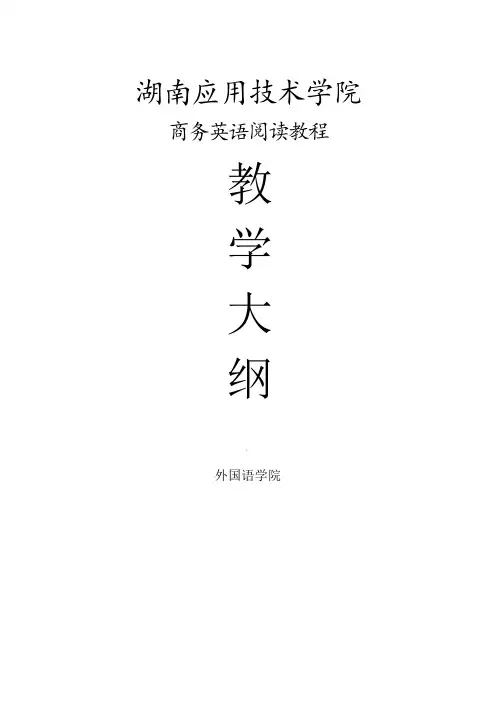
湖南应用技术学院商务英语阅读教程教学大纲、外国语学院《商务英语阅读教程(三)》教学大纲课程代码:02 开课学期:第二学年第一学期适用专业:商务英语专业学时:32编写教师:学分:2审核:陈勇、郭俊兰、张霞辉审批:陈勇第一部分说明一、课程的性质、作用本课程是为商务英语专业开设的必修课程。
本课程的作用在于传授学生有关的阅读与技巧,提升学生的商务英语阅读水平与理解能力,扩大阅读词汇,增加英语国家文化背景知识,为学生参加专业四、八级考试及其他形式的英语考试奠定良好的基础。
学生通过有目的、较系统地阅读英语国家纸媒和网媒的精选文章,逐渐掌握泛读的基本技巧,了解一些英美国家的历史、文化、地理、政治、军事、法律、经济、金融、体育、经贸、环保、能源等方面的基本知识。
从而为学生独立阅读各种商务英语文章打下良好的基础。
二、课程的任务与基本要求本课程的任务是提高阅读速度,强调阅读速度与理解能力并重;掌握文章体裁、风格及相应的阅读方法;扩大词汇量,掌握基本句式,较能通顺的翻译句子和段落;较熟练地概括文章段落大意,培养较强的文章分就析归纳能力;较全面的了解英语国家政治、经济、文化、科技等方面的知识;增加英语国家背景知识,增强跨文化交际能力。
本课程重点讲述商务英语阅读的基本原理、阅读技巧和实践方法,侧重于英语学习者语言综合知识的运用。
因而,在本课程的教学过程中,必须使学生真正透彻地领会诸如阅读的过程、图式理论、构词法、猜词技巧、句子与句子的关系、话题与话题句、要旨、推理与判断、文体与风格等阅读理论内涵;要注重阅读理论与阅读实践的紧密结合,处理好阅读速度与理解之间的关系,避免知识的重复和脱节,从而使学生能够得到比较系统而全面的英语阅读基本技能。
三、教学方法建议针对阅读课教学的自身特点,课堂教学应贯穿以学生为主体、教师为主导的教学模式。
在讲解阅读技巧的同时应辅以大量的阅读实践,在大量的阅读过程中体会并掌握各种阅读方法,达到逐渐提高阅读理解能力与阅读速度的目的。
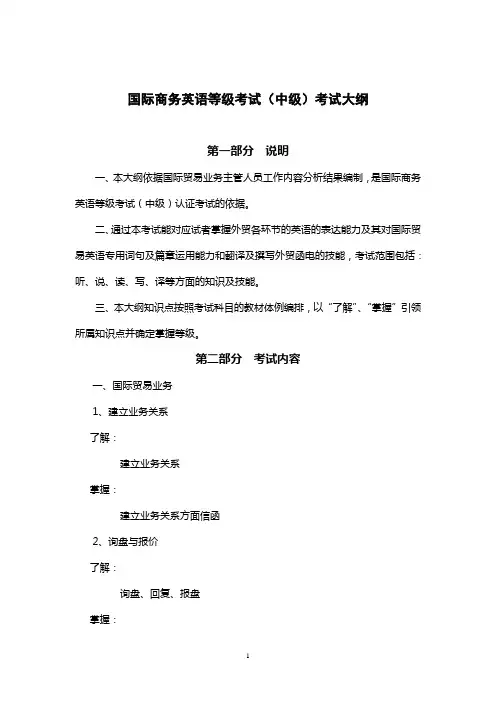
国际商务英语等级考试(中级)考试大纲第一部分说明一、本大纲依据国际贸易业务主管人员工作内容分析结果编制,是国际商务英语等级考试(中级)认证考试的依据。
二、通过本考试能对应试者掌握外贸各环节的英语的表达能力及其对国际贸易英语专用词句及篇章运用能力和翻译及撰写外贸函电的技能,考试范围包括:听、说、读、写、译等方面的知识及技能。
三、本大纲知识点按照考试科目的教材体例编排,以“了解”、“掌握”引领所属知识点并确定掌握等级。
第二部分考试内容一、国际贸易业务1、建立业务关系了解:建立业务关系掌握:建立业务关系方面信函2、询盘与报价了解:询盘、回复、报盘掌握:首次询盘信函的一般内容及结构3、订购与确认了解:订单及订单的主要内容掌握:正式定单及无正式订单的订购信函寄送订单及订购信的一般内容4、支付了解:外贸业务中的几种付款方式信用证在外贸业务中的意义及其种类掌握:信用证付款方式来往信函的基本内容及写作5、保险了解:外贸业务中的一般保险知识掌握:买卖双方就保险问题交换的信函内容及写作6、包装了解:包装的种类及作用掌握:买卖双方就包装问题交换的信函内容及写作7、装运了解:外贸业务的主要运输方式掌握:买卖双方就货物装运来往信函的内容及写作8、销售合同的谈判与签订了解:合同谈判的四大程序:询价、发盘、还盘及接受掌握:合同谈判往来信函及写作9、信用证的审核与修改了解:信用证的主要内容掌握:信用证的审核与修改10、索赔与仲裁了解:索赔及仲裁程序、方式等二、中级商务英语听力掌握:国际贸易各环节的听力训练三、中级商务英语会话掌握:能用英语进行日常商贸沟通能进行的商务英语谈判第三部分考试形式一、考试形式:笔试与听力,考题分主观题和客观题,客观题答案做在答题纸上,主观题答案做在试卷上。
其中听力内容读两遍。
二、考试时间:120分钟。
三、考试评分:笔试加听力满分100分,60分为及格标准,根据各部分的难易程度,评分的比例用%表示。
第四部分考试题型及考核目标一、听力:应试者根据所听的内容,完成试题中的填充、选择、判断或回答问题。
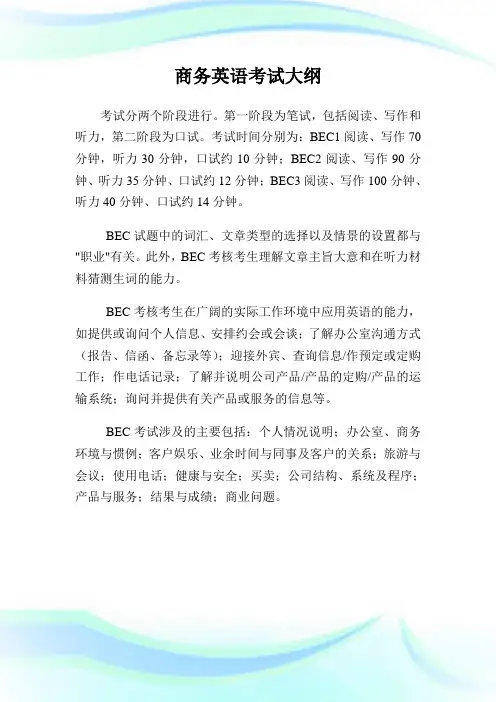
商务英语考试大纲
考试分两个阶段进行。
第一阶段为笔试,包括阅读、写作和听力,第二阶段为口试。
考试时间分别为:BEC1阅读、写作70分钟,听力30分钟,口试约10分钟;BEC2阅读、写作90分钟、听力35分钟、口试约12分钟;BEC3阅读、写作100分钟、听力40分钟、口试约14分钟。
BEC试题中的词汇、文章类型的选择以及情景的设置都与"职业"有关。
此外,BEC考核考生理解文章主旨大意和在听力材料猜测生词的能力。
BEC考核考生在广阔的实际工作环境中应用英语的能力,如提供或询问个人信息、安排约会或会谈;了解办公室沟通方式(报告、信函、备忘录等);迎接外宾、查询信息/作预定或定购工作;作电话记录;了解并说明公司产品/产品的定购/产品的运输系统;询问并提供有关产品或服务的信息等。
BEC考试涉及的主要包括:个人情况说明;办公室、商务环境与惯例;客户娱乐、业余时间与同事及客户的关系;旅游与会议;使用电话;健康与安全;买卖;公司结构、系统及程序;产品与服务;结果与成绩;商业问题。
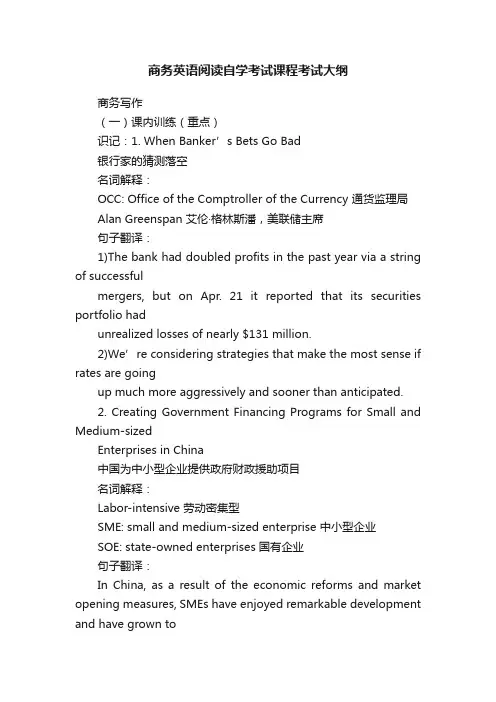
商务英语阅读自学考试课程考试大纲商务写作(一)课内训练(重点)识记:1. When Banker’s Bets Go Bad银行家的猜测落空名词解释:OCC: Office of the Comptroller of the Currency 通货监理局Alan Greenspan 艾伦·格林斯潘,美联储主席句子翻译:1)The bank had doubled profits in the past year via a string of successfulmergers, but on Apr. 21 it reported that its securities portfolio hadunrealized losses of nearly $131 million.2)We’re considering strategies that make the most sense if rates are goingup much more aggressively and sooner than anticipated.2. Creating Government Financing Programs for Small and Medium-sizedEnterprises in China中国为中小型企业提供政府财政援助项目名词解释:Labor-intensive 劳动密集型SME: small and medium-sized enterprise 中小型企业SOE: state-owned enterprises 国有企业句子翻译:In China, as a result of the economic reforms and market opening measures, SMEs have enjoyed remarkable development and have grown tobecome an important force in contributing towards sustained and rapid growthof the Chinese economic.(三)课外练习(一般)理解:1.Carlyle Group’s Asian Invasion加雷集团的亚洲扩张名词解释:V enture-capital 风险资本Carlyle Group 凯雷投资集团Citigroup 花旗集团2. Why the Dollar Is Blooming Again为什么美元再次复兴?名词解释:Greenback 美元(俚语)Lehman Brothers Inc 雷曼兄弟公司European Central Bank 欧洲中央银行Federal Reserve Bank 美国联邦储备银行(四)拓展阅读(一般)理解:1. How Banks Pretty up the Profit Picture银行如何美化收益前景2. Thai Stocks What Goes Up泰国股市:到底是怎么了?3. Inventing to Order以市场为导向开发产品4. I t’s an Office Party in Hong Kong香港办公楼地价之争第二单元人力资源管理(一)课内训练(重点)识记:1. China’s Problem of Labor中国人力资源问题名词解释:Confucian heritage 孔子遗训Micro-managing 微观管理Job rotation 轮岗句子翻译:1)Many underestimate the cost of local staff. Chinese graduates often havean inflated view of their own, complain some foreign managers.Multinationals are als o competing for talent with China’s domesticcompanies, which need to improve the quality of their people as theirmarkets open to foreign rivals.2)But the growing shortage of executive talent may make the growthassumptions written into many business plans over-optimistic.2. No Prizes for Runners-up奖励只给最优秀的员工名词解释:Redundancy payment 冗余支出Benefit package 福利包Merit budget 贡献奖Flexible reward 灵活的奖励方式Egalitarian Europe “人人平等的欧洲”句子翻译:1\But benchmarking employees, and then paying them different rates, can turn out to be a minefield if handled badly.2\Those that want rewards to be cost-effective but memorable are seeking the services of firms that specialize in employee recognition.(三)课外练习(一般)理解:1. The Inside Story(PartⅠThe Power of Online HR Management)背景故事:(一、在线人力资源管理的威力)名词解释:Ford 美国福特汽车公司BP British Petroleum 英国石油公司Outsource 人力资源外包Holiday entitlement 员工休假权Expatriate employee 外派员工2. The Inside Story(PartⅡOnline Training as an Alternative)背景故事:(二、在线培训)名词解释:Curriculum Vitae 个人履历表(四)拓展阅读(一般)理解:1. Organized Labor Revival(PartⅠAre Unions Declining in Europe?)工会组织的复兴(一、欧洲工会组织正在消亡?)2. Organized Labor Revival(PartⅡUnion Revival,True or Not?)工会组织的复兴(二、工会组织正在复兴?)3. Case Study Is There a Nice Way to Fire Y our Employees?案例分析:真有合理地解雇员工的好办法吗?4. Hold that Body Count!人力的真正意义!第三单元市场(一)课内训练(重点)识记:1. Celebrity Endorsements as a Strategy营销策略之名人效应名词解释:Bill Cosby 比尔·考斯比,美国黑人,喜剧之父句子翻译:Alternatively, advertisers can choose to use “spokescharacters”.Owens-Corning has used the Pink Panther for nearly 20 years to endorse itsinsulation products, and Metropolitan Life has used the Peanuts gang topromote its insurance policies. Another way advertisers protect themselves isby using deceased celebrities. Through the wonders of technology, televisionviewers see screen legends John Wayne pitching Coors beer and Fred Astairedancing with a Dirt Devil vacuum cleaner.2. Challenges in Global Advertising and Promotion 广告及销售全球化的挑战名词解释:A von China Inc. 雅芳(中国)公司FedEx 联邦快递,全球最大的快递公司James Bond 詹姆斯·邦德,代号007,全球知名的英式间谍形象句子翻译:1)The style of the ad. Is also important, because comparative ads, whileacceptable and even common in the United States and Canada, are lesscommonly used in the United Kingdom, unacceptable in Japan, and illegalin India and Brazil.2)Coca-Cola’s Indian subsidiary was forced to end a promotion that offeredprizes such as a trip to Hollywood, because it encouraged customers to buyin order to gamble, in violation of India’s established trade practices.(理解:1. Advertisement 广告名词解释:Bureau of Public Enterprise, BPE 国有企业局,实际负责推动民营化计划的机构Management Information System (MIS) 管理信息系统Manual of accounting procedure 会计手续规则2. Marketing to Latinos and African Americans 拉丁美洲及非洲的营销策略研究(四)拓展阅读(一般)理解:1. Advertising on the Web Companies Grab the Brass Ring网络广告:公司的新商机2. From Harley-Davidson Armchairs to Coca-Cola Fishing Lures The Rise ofCorporate Branding企业品牌化的兴起:从哈雷牌轮椅到可口可乐牌鱼饵3. Offering Guarantees to Promote Sales提供质量保证以提高销售额度4. Power Pricers: How Smart Companies Use Price as a Strategic Tool价格的威力:精明商家的价格策略第四单元管理(一)课内训练(重点)识记:1. Cross-cultural Management 跨文化管理名词解释:MBA: Master of Business Administration, 工商管理硕士Pay-for-performance (PFP) 业绩付酬—按照实际业绩付给酬劳Matrix structure 矩阵结构句子翻译:A fairly obvious cultural divide that has been much studied is the onebetween, on the one hand, the countries of North America and north-westEurope, where management is largely based on analysis, rationality, logic andsystems, and, on the other, the Latin cultures of southern Europe and SouthAmerica, where personal relations, intuition, emotion and sensitivity are ofmuch greater importance.2. Motorola Modes of Handling Ethical Issues Transculturally跨文化管理“摩托罗拉模式”所遵循的原则是什么?句子翻译:1)The simplest mode is one in which Motorola makes no particular effort toadjust to the local culture, but merely clarifies its policy on a given issue, andimplements that policy regardless of whether it overlaps with the values orstandards of the host culture.2)In some situations, the overlap between Motorola’s standards and certainpractices of the host culture might be so limited that the corporation has nochoice other than simply to abide by its own standards and attempt to remainviable in that country.理解:1. Might the Proper Study of Management Be Man?管理的核心是管理人?名词解释:Stock market 证券市场Zeitgeist 时代精神Theory X(Y) X(Y) 理论2. No more Boring Analysis无需反复研究管理方式(四)拓展阅读(一般)理解:1. Will This Merger Go Down Smoothly?这一次的收购会顺利进行吗?2. Citi: A Whole New Playbook 花旗集团:一个全新的开始3. Do Y ou Really Need an MBA? 你真的需要一个MBA文凭吗?4. Going Global by Thinking Local 立足本土,走向国际第五单元贸易识记:1. Trade Disputes商务争议名词解释:Comparative costs 比较成本Specialization 专业化生产Insight 洞察力Nobel laureate 诺贝尔奖获得者Productivity 生产力Mainstream economists 主流经济学家avid Ricardo 大卫·李嘉图英国经济学家著有《政治经济学几赋税原理》句子翻译:Even if one country can make everything more cheaply than every other it still gains from focusing on the goods in which its relative advantages isgreatest —i.e., in which it has a comparative advantage —and importingthe rest.2. A Sale Contract 销售合同名词解释:FOB: Free on Board 船上交货价格, 离岸价格CIF: Cost Insurance and Freight 到岸价格CFR: Cost and Freight成本加运费价FCA: Free Carrier货交承运人CPT: Carriage Paid to 运费付至CIP: Carriage Insurance Paid to运费、保险费付至EXW: Ex Work 工厂交货DDU: Delivered Duty Unpaid未完税交货DDP: Delivered Duty Paid完税后交货Remittance 汇票T/T 电汇M/T 信汇Banker’s draft 银行汇票Commercial Draft 商业汇票Documentary Collection 跟单托收D/P Sight: Documents against Payment at Sight 即期付款交单D/P after Sight: Documents against Payment after Sight 远期付款交单D/A: Documents against Acceptance 承兑交单Letter of Credit 信用证Irrevocable L/C 不可撤销信用证Sight L/C 即期信用证Usance L/C 远期信用证Transferable L/C 可转让信用证句子翻译:The Buyers shall open with a bank to be accepted by both the Buyers and Sellers an irrevocable transferable letter of credit, allowing partial shipment,transshipment in favor of the Sellers and addressed to Sellers payable at sightagainst first presentation of the shipping document to Opening Bank. Thecovering letter of credit must reach the Sellers 30 days before shipment andremain valid in China until the 21st day (inclusive) from the date of shipment. (三)课外练习(一般)理解:1. Business Negotiation 贸易磋商2. Two Business Letters 商业信函实例(四)拓展阅读(一般)理解:1. A Letter of Credit 信用证2. A Business Letter—Revise Former Letter of Credit信用证修订书3. A Booking Order订舱委托书4. A Commercial Invoice商业发票第六单元经济全球化识记:1. Game Theory博弈论名词解释:Oligopoly 求过于供的市场情况Price cutting 大减价Dilemma 困境Game theory 博弈论Adam Smith 亚当·斯密,英国古典政治经济学代表人物,著有《国富论》Invisible hand “看不见的手”句子翻译:Game theory has been used by economists to study theinteraction of oligopolies, on-management disputes; countries trade policies, internationalenvironmental agreements, reputations, and a host of other situations.2. E-Commerce: The Kitty Hawk Era电子商务:Kitty Hawk时代名词解释:Sales volume 销售量Megastore 超级卖场Cyberspace 网络空间Distributor 分销商Retailer 零售商Intermediary 中介Stockbroker 股票经纪人Dealer 经销商Leverage 杠杆作用E-commerce 电子商务Wal-Mart 沃尔玛,世界第一大零售商Brick-and-mortar 传统意义上的公司句子翻译:1)Slowly but surely, consumers are leaving malls to shop on-line, often intheir pajamas at 11 PM. And anyone who doubts the potential power of thee-commerce juggernaut hasn’t grasped the advantage for both consumersand businesses.2)All companies fear the leverage gained by consumers who can demandever-lower prices. Finally, businesses are rapidly learning that it isn’tenough to tack the suffix “dot com” onto the company name.理解:1. The Logic of Economics经济学逻辑名词解释:Inflation 通货膨胀Tariff 关税Quota 配额Tax cuts of 1964 美国1964年的减税政策Great Depression 1929年至1933年的西方世界的经济大萧条2. The Four Wheels of Growth 促进经济增长的四个要素(四)拓展阅读(一般)理解:1.Careers in Global Marketing 全球营销下的职场规划2. How Markets Solve the Three Economic Problems市场解决三大经济问题的途径3. Global Marketing What It Is and What It Is Not揭开全球营销的面纱4. The Business-to-business Cyber-buying Bazaar网络购物市场第三部分有关说明与实施要求(一)阅读理解Reading comprehension.Although it is nothing new for companies to build relationships with customers, it has generally been done on a one-to-one basis. In recent years, however, technological developments have made it possible to build up individual relationships with clients on a much larger scale, and this more sophisticated kind of operation is known as relationship marketing. Relationship marketing aims to increase sales through deliberate efforts to retain customers and promote two-way communication with them and new technology has make communication possible with a for larger customer base than before. The information gathered forms the basis of highly technical analyses of customer purchasing and profitability, which can be used to increase sales.The building of good personal relationships with customers is usually integral to the management of small businesses, and owners of small corner shops clearly illustrate the essence of relationship marketing, although the technology available to them is far less advanced than that available to, say, a supermarket chain. Small shopkeepers have direct knowledge ofregular customers and become familiar with their needs, likes and dislikes. The shopkeepers can then provide services tailored to individual needs. Over time, a bond of loyalty is likely to develop between shopkeepers and regular customers.The benefits of relationship marketing enjoyed by small businesses are now available to big businesses, thanks to a number of developments. First and foremost is the increasing recognition of the importance of profitability of retaining existing customers. Secondly, technologies have been developed which enable the collection, manipulation and analysis of huge banks of customer information. Large retailers can use store cards to obtain detailed background information about customer’s ages, salaries and lifestyles, and point-of-sale technology can be sued to track purchases made by every customer. Electronic storage enables all of this information to be retained, manipulated and integrated, while detailed analyses can be carried out on ever more powerful computers. Companies are thus able to target individuals amongst their thousands of customers with unique promotions or information matched to their back grounds and to their purchasing tendencies. Thirdly, companies feel a need to use relationship marketing because of increased competition: amassing knowledge about customers and building up customer relationships through interactive contact can enable organizations to differentiate their products orservices more easily form those of competitors.However, relationship marketing is not always the right route for organizations to take, and is not appropriate for all customers. Some bank customers, for example, cost more to serve than the bank actually makes form their custom, while a supermarket customer who spends very little and does not shop regularlydoes not justify the expenditure of several pounds per annum on relationship marketing. In addition, customers may not always be interested in a relationship, even where there are demonstrable benefits to be had.Overall, successful relationship marketing depends upon selecting and targeting the customers you wish to retain, and identifying sales areas where the investment and effort will be worthwhile. Many organizations have found the approach to be very rewarding in terms of customer retention and related profitability, but relationship marketing is still a developing field and is neither cheap nor easy to operate. It involves an integrative approach which draws marketing, quality and customer service together; it also depends upon developing the capacity of every employee particularly front-line staff to market the goods or services of the organization in a customer-focused way; and finally, it can require heavy investment in appropriate information technology.1. In the first paragraph, the writer describes relationship marketing as ____.A. an idea that has passed in and out of fashion over the last few years.B. a term used for an activity that used to exist in a more basic form.C. a way for a company to advertise to its customers.D. a way for a company to analyze its profitability.2. Why are small shopkeepers used to illustrate relationship marketing?A. Their success depends on their relationships with their customers.B. They keep information about their customers on computer.C. They were the first to use the term relationship marketing.D. Their relationship with customers has started to change recently.3. One reason why large companies didn’t use relationship marketing in the past is that ____.A. they underestimated the true value of customer loyalty.B. heir customers didn’t want them to collect information.C. they didn’t need to find out about individual customers.D. they didn’t think they could justify the expenses.(二)快速阅读Skimming and scanning.There are various ways in which individual economic units can interact with one another. Three basic ways may be described as the market system, the administered system, and the traditional system.In a market system individual economic units are free to interact among each other in the marketplace. It is possible to buy commodities from other economic units or sell commodities to them. In a market, transactions may take place via barter or money exchange. In a barter economy, real goods such as automobiles, shoes, and pizzas are traded against each other. Obviously, finding somebody who wants to trade my old car in exchange for a sailboat may not always be an easy task. Hence, the introduction of money as a medium of exchange eases transactions considerably. In the modern market economy, goods and services are bought or sold for money.An alternative to the market system is administrative control by some agency over all transactions. This agency will issue edicts or commands as to how much of each good and service should be produced, exchanged, and consumed by each economic unit. Central planning may be one way ofadministering such an economy. The central plan, drawn up by the government, shows the amounts of each commodity produced by the various firms and allocated to different households for consumption. This is an example of complete planning of production, consumption, and exchange for the whole economy.In a traditional society, production and consumption patterns are governed by tradition; every person’s place within the economic system is fixed by parentage, religion, and custom. Transactions take place on the basis of tradition, too. People belonging to a certain group or caste may have an obligation to care for other persons, provide them with food and shelter, care for their health, and provide for their education. Clearly, in a system where every decision is made on the basis of tradition alone, progress may be difficult to achieve. A stagnant society may result.1. What is the main purpose of the passage?A. To outline contrasting types of economic systems.B. To explain the science of economics.C. To argue for the superiority of one economic system.D. To compare barter and money-exchange markets.2. In the second paragraph, the word “real” in “real goods” could best be replaced by ____.A. high qualityB. concreteC. utterD. authentic3. According to the passage, a barter economy can generate ___.A. rapid speed of transactionsB. misunderstandingsC. inflationD. difficulties for the traders4. According to the passage, who has the greatest degree of control in the administered system?A. Individual householdsB. Small businessesC. Major corporationsD. The government5.Which of the following is not mentioned by the author asa criterion for determining a person’s position in a traditional society?A. Family backgroundB. AgeC. Religious beliefsD. Custom(三)名词解释Define the following terms.1. Booking order2. CFS(四)回答问题Answer the following questions.With no laor shortage, what prosperity will it expect in the article?(五)翻译Translate the following sentences into Chinese.In China, as a result of the economic reforms and market opening measures, SMEs have enjoyed remarkable development and have grown to become an important force in contributing towards sustained and rapid growth of the Chinese economic.商务英语沟通Business English CommunicationChapter One How to Apply for the Ideal Job(如何申请理想的工作) 本课要点一.Reading Job Advertisement (解读招聘广告)As you read , ask yourself these question1.Do I have the formal qualification required ?2.Do I have the experience required ?3.Am I really suited for the job ?4.What do I know about the employer ?5.What makes me specially suited for the job ?二.Analysing a Specific Job Advertisement (分析特定的招聘广告)三.What to Mention in Y our Letter or Email (在求职信件中该写些什么)四.Attracting an Employer’s Interest (引起招聘者的注意)五.Hints and Tips (技巧提示)Here are some good ways to make your application letter stand out:1.Look for something unusual in your experience or qualifications2.Make the contents of your letter appropriate for the job3.A void annoying phrases4.Get someone to read your letter before you send itNEVER send your first draft !5.Keep the letter short6.Mention the organisation7.Make your letter physically easy to read* Don’t use handwriting * Use a good quality printer * Use short sentences and paragraphs * Use plenty of breaks and white space * Use a type or font that can be easily read and use 12-point size* Don’t overuse italics ,bold, underlining or CAPITALS * Use a spell-check programme but don’t rely onthat alone. Y ou must also check your letter personally before you send it .* Don’t use coloured or fancy paper8.Remember to state which job you are applying for9.Be realistic10.Check again六.Practice Makes Perfect (实践造就完美)专业词汇Reputation 名誉声望Professional 专业人员职业运动员Qualification 资格Unpredictability不可预测性Continuity 连续性Candidate 候选人应试者Architect 建筑师Job seeker 求职者People-orientated 以人为本的Prestige 威望影响力Application letter 求职信Interview 面试采访Offend 冒犯Summarize 总结概述Demonstrate 证明示范Commitment 承诺保证Innovation 革新Coverage 新闻报道Template 模板Overlook 俯瞰忽视Chapter T wo Resume and the Interview (简历与面试)本课要点一.The Rasume or Curriculum V itae (简历)二.The Essentials(基本要素)*Full name in Chinese characters and Pinyin. Underline your family name*Adress*Telephone Number*Age, indicated by date of birth*Gender, indicated by Mr, Mrs, Miss, Ms.Here are some of the things that can be included if you have them :*e-mail address*Fax number*PhotographQualifications : List your qualifications clearly , starting with the highestEducation : List the school and other educational institutions you have attended, again starting with the highest or most recent.Previous EmploymentSkillsInterests and hobbiesFuture career三.Model resume (single-page version)(简历样本)四.Interview Essentials(面试要点)五.What Do Y ou Do Now(如何准备)Times spent in preparation is never wasted. Time wasted is never spent in preparation.Quite simply, to be totally confident about your chances of success you must know almost everthing there is to know about : *The company*The job advertised*The overall business environment the company operates in *The business culture of the company*Existing employees you might know*Where you might fit into the company*The salary you might be offered六.The Big Day (面试当天)七.What Do I Wear(如何着装)八.What Questions Will They Ask(面试问题)九.Be Positive(要积极主动)十.Y ou Do the Talking (把握表述机会)十一.Dealing with Negatives at the Interview (正确处理面试中的消极因素)十二.Strength from Weakness(变不利为有利)十三.Hints and Tips (技巧提示)*Names *Eye contact *Sit comfortably专业词汇Curriculum vita 个人简历Resume 履历Clerk 文员Coordinator 协调员Turnover 营业额Orchestra 管弦乐队Martial arts 武术Facility 设备Innovation 革新创新Sector 部门Annual report 年度报告Trainers 运动鞋Pattern 模式图案Consultancy 咨询公司Bachelor 学士Master 硕士Doctor (Ph.D)博士Chapter Three Spoken Business Communication (口头商务沟通) 本课要点*The first, as always, is to spend as much time as possible on preparation.*The second is to think carefully about the actual content.*The third is to practise your presentation.一.Preparing for the Talk (为演讲准备)1.The audience2.The introduction3.The facts4.V isual aids5.Don’t trust the technology6.The venue7.The length8.Be ready for questions二.Preparing The Content (搜集素材)1.Structure*A clear introduction is essential.*Then you move onto the main part of your presentation.*Finally, you must have a conclusion.2.How long shoud your presentation be?Keep It Short and Simple三.Practice and Presentation Techniques(练习示范与演讲技巧)四.Hints and Tips(技巧提示)1.When you stand up to begin, take your time and try not to appear nervous.2.Most of the time you will be speaking to people who want to hear what you have to say.3.Talk to the people in the audience.4.Be careful about the things you do with your hands when speaking.5.Don’t just read your speaking notes.6.Don’t speak too fast./doc/b214476027.html,e only a few, well-chosen, visuals.8.Pause before you move into the final part of your speech.9.Don’t run away the minute you have completed your presentation.五.Practice Makes Prefect(实践造就完美)专业词汇Presentation 发言陈述conciseness 简明address 致辞演讲conference 会议协商Technician 技术员Chief Executive Officer 首席执行官layout 布局atmosphere 气氛Regional sales manager 地区销售经理audio-visual aids 视听辅助工具lectern 讲台Recruit 征募招聘draft 草图汇票resist 抵抗distraction 注意力分散temptation 诱惑Conclusion 结论pause 停顿volume 音量书卷eye contact 目光接触眼神交会Chapter Four Communicating with Colleagues and Customers(同事沟通及客户沟通)本课要点一.Unspoken Messages (非言语信息)Here are a few questions to consider about non-verbalcommunications :1.How do you think you look?2.How can you change your clothing message ?3.What non-verbal communications do you not like ?4.What assumptions do you make ?5.Do you make group assumptions ?二.Friendly Communications(传递好消息)三.Communicating Sensitively(敏感性沟通)四.Problem Communications(问题沟通)五.Hints and Tips(技巧建议)1.Stay clam2.Listen3.Don’t assume4.Explain clearly5.Speak clearly*Do not use jargon.*Do not use long words where short ones will do.*Make sure that you speak at a speed that allows people to understand what you are saying.*Pause frequently.6.Ask for details7.Check and respond8.Close六.Hearing and Understanding----Achieving Both(倾听与理解----两者兼顾)七.Action(行动)1.Do we want the person to decide the action after communicatiion?2.Do we want the person to take action that we have alreadydecided?3.Do we understand the effects the action may produce?八.Checking(核查)*Ask question.*Do not make assumptions.九.Communicating with Bosses(与老板沟通)“The boss may not always be right,but he or she is always the boss.”1.Listen2.Ask for suggestions3.Lead your ideas into the ideas of the other person4.Explain clearly5.Ask for suggestions again6.Offer to revise7.Checking8.Follow up十.A Fact(忠告)“Success has many fathers.Failure is an orphan.”专业词汇Comment 评论意见potential 可能性潜力context 语境背景phenomenon 现象奇迹Criminal 罪犯investment adviser 投资顾问district 行政区地区bonus 奖金红利Dedication 奉献commitment 委托提交initiative 主动权首创精神announcement 宣布通告identification card 身份证embarrassment 尴尬拮据maintenance 维修保持Reprimand谴责训斥conversation 谈话社交grievance不满委屈jargon行话component 组件Chapter Five Written Communication(书面沟通)本课要点一.Composing Y our Message(内容组织)*Take the example of a proposed meeting. It’s no good writing a message saying that a meetingis to be held if you don’t state what is going to be discussed.*No one will come to your meeting unless you give him or her a good reason why they should attend.*Unless you state a date and time when a meeting is going to be held people can’t att end.*Where the meeting is to take place is also vital.*Who is to be involved is also essential information. People will not come to an event if they do not know that their attendance is expected.*What is the sequence of events? How will decisions be implemented?二.Written Forms of Communication(书面沟通的形式)*Y our communication should not include unnecessary information.*Y our communication must have appropriate content.*Y our communication must contain the correct facts.*Y our communication should aviod the use or jargon and unnecessary technical terms.*Y our communication should introduce the purpose and mission of the paper, have anexplanatory content and should end with a clear conclusion or recommendation.*Y our communication should always be spell-checked and read by a colleague before it is issued.三.Let’s Practise(练习)四.Hints and Tips(技巧建议)1.Size Matters. Use a 12-point type./doc/b214476027.html,e white space.3.Read aloud.专业词汇Electronic storage 电子储存memo 备忘录sequence 顺序agenda 议程proposal 提议求婚Biography 传记个人简介quotation 引文报价单recommendation 推荐信bangle 手镯Pendant 耳环坠子text message 短信international purchasing manager 国际采购经理Explanatory comment 备注assessment 评价估计payment due 已到期应付款scissor 剪刀删去Stapler 订书机Cash flow 现金流amateur 爱好者外行sponsorship 赞助Chapter Six Business Meeting(商务会议)本课要点一.Why People Hold Meetings (为何举行会议)*To communicate policies *To issue instruction *T o listen to review *To hold discussions*To ensure that everyone is aware of what is going on *To review experiences and future action*T provide written records二.Meeting Styles (会议风格)Authoritarian Inclusive Combat Routine Informal三.Writing the Records of Business Meeting (商务会议纪要)四.The Disadvantages of a V erbatim Record (逐字逐句的会议记录的缺点)*They contain full information about when and where the meeting took place.*They record the names of the people taking part.*They list people who did not attend.*They record who made what decision.*They list points for action.*They are short and concise.*They remove duplications.*They are easy to access and can be held in electronic form.。
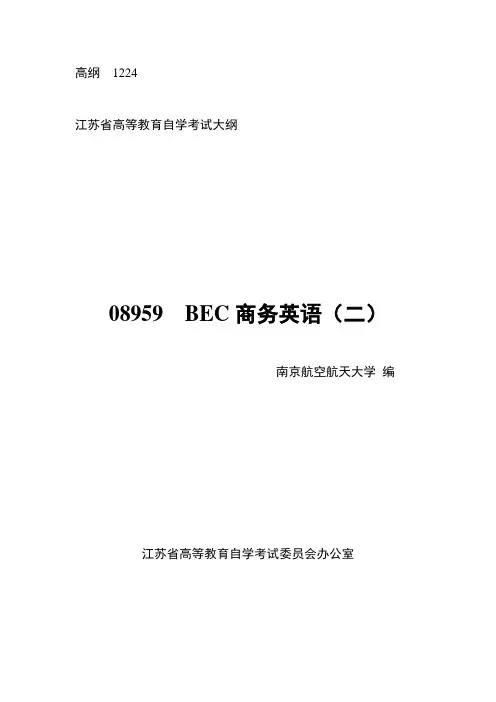
高纲1224江苏省高等教育自学考试大纲08959 BEC商务英语(二)南京航空航天大学编江苏省高等教育自学考试委员会办公室一、课程性质及其设置目的与要求(一)课程性质和特点BEC商务英语(二)是我省高等教育自学考试商务英语专业(本科段)的学位课程。
其任务是培养应考者系统地学习在商务活动中常见的英语语言,了解商务运作和沟通的基本原理和实用技巧,掌握商务活动各环节中基础英语的表达方式以及商务英语专用词与句式的运用。
(二)本课程的基本要求本课程共分为12个单元,主要包括与人沟通(电话交流技巧与商务信函撰写等)、商务活动(创业、会议、促销等),商务管理(招新、培训、人文与法规等)等内容。
通过对本课程的学习,要求应考者对商务英语有一个全面和正确的了解。
具体应达到以下要求:1.了解商务运作和沟通的基本原理和实用技巧;2.学习商务活动中常见的英语语言;3.理解并掌握商务活动各环节中英语专用词、句式的表达方式和运用。
(三)本课程与相关课程的联系BEC商务英语(二)不仅讲授商务知识,更侧重的是英语语言的习得,它是以商务运作的各个环节为背景,彰显英语语言在商务环境中的特殊用途;是商务运作和英语语言两者的结合。
因此,本课程学习的功效将直接影响外贸口语、商务口译、商务沟通、商务贸易实务、国际贸易虚拟运行等课程的学习。
二、课程内容与考核目标(一)课程内容依据教材、教学大纲及需掌握的基本要素,本大纲将应考者须掌握的语言功能及商务技能分成12个模块。
(二)考核目标紧扣教材中呈现的商务活动和沟通的基本原则及实用技巧,重点考查商务活动中所涉及的英语知识和商务常识。
应考者须全面掌握教材的基本内容,并结合大量课外材料的阅读,在掌握基础理论的基础上完成考核要求。
试题涵盖最基本的商务英语词汇和句式,以及商务活动中日常内容,例如工作方式、公司福利、广告、招新、促销、培训和品牌化等。
三、有关说明和实施要求(一)关于“课程内容与考核目标”中有关提法的说明1.关于教材的内容:本教程使用的是新编剑桥商务英语(中级)一书,书中有大量的听说材料;尽管考核中不包括听力和口语题型,但教材中的听说材料在平时学习时应充分予以重视和利用。
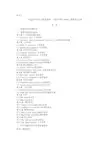
附件3广东省自学考试《商务英语》(课程代码:00796)课程考试大纲目录一、课程性质与设置目的二、课程内容和考核目标第1章个人信息及职业信息1.1 World of work 工作种种1.2 Personal and professional details 个人信息及职业信息第2章工作安排2.1 Work in progress 工作进展2.2 Making arrangements工作安排第3章公司简介及业绩3.1 Company biography 公司简介3.2 Company performance 公司业绩第4章国际企业4.1 International business国际企业4.2 Business communications 商业联系第5章职业选择及计划5.1 Career choices职业选择5.2 Achievements and plans 业务成果与计划第6章商业旅行及安排6.1 Business travel 商业旅行6.2 Travel arrangements 旅行安排第7章产品与服务7.1 Products and services产品和服务7.2 Orders and contracts订单及合同第8章生产过程8.1 Manufacturing processes生产过程8.2 Problems and solutions问题及解决方案第9章未来9.1 The future未来9.2 Meetings会议第10章职业发展10.1 Career development职业发展10.2 Organizing a conference组织会议第11章健康与安全11.1 Health and safety健康及安全11.2 Reporting accidents事故报告第12章就业市场12.1 The job market就业市场12.2 Job applications 工作申请三、关于大纲的说明与考核实施要求附录:题型举例一、课程性质与设置目的(一)课程的性质与特点《商务英语》是广东省高等教育自学考试中英合作商务管理专业与金融管理专业的必修课。

商务英语考试大纲第一篇《商务英语》课程考试大纲第一部分一、课程性质《商务英语》是高等教育自学考试电子商务(专科)专业的一门选修课。
本课程是一门实践性和应用性很强的课程,是为经济类专业和非经济管理类专业开设的一门专业基础课。
它帮助学生掌握用英语处理营销基本业务的能力。
二、课程目标与基本要求通过对国际商务英语写作、阅读以及国际营销知识的学习,旨在培养提高学生在国际商务英语方面的写作阅读翻译和口头表达等方面的语言能力,即能够熟练掌握具有国际商务特色的英语应用能力。
通过本课程的学习,使学生了解商务应用文的语言特点、格式特点,了解写作步骤,通过循序渐进的练习,掌握商务活动中应用文体的写作,主要包括英文商务书信、备忘录、通知、报告、邀请信等应用文体。
另外,本课程帮助学生了解市场营销方面的专业知识,提高阅读英语专业文章的能力,在阅读中了解营销专业的市场购买行为、产品策略、定价策略、分销策略、促销策略、营销人员策略等方面的知识。
《商务英语》是一门实践性较强的课程,所以教师在讲授该课程时,应适当增加一些案例教学,以增强学生的感性认识。
三、本课程与相关课程的关系无先行课程第二部分课程内容与考核目标第一章一、学习目的和要求1.掌握英文商务书信写作的基本要求2.熟悉市场、市场营销及营销管理理念的基本知识二、考核知识点与考核目标1.了解英文商务书信的基本原则:简洁。
2.了解营销和市场的概念,了解五种营销行为的概念。
3.掌握英文书信的四个主要步骤,包括布局安排、有条理地写出主要相关信息、写出短文、检查短文(次重点)。
4. 掌握根据特定的主题写作英文商务书信(重点)。
第二章一、学习目的和要求1.掌握英文备忘录写作的基本要求2.熟悉市场战略计划和市场细分的基本知识。
二、考核知识点与考核目标1.了解英文备忘录使用的相关语言(一般)。
2.了解市场战略计划和市场细分的基本知识(一般)。
3.掌握英文备忘录的四个主要步骤,包括布局安排、有条理地写出主要相关信息、写出短文、检查短文(次重点)。
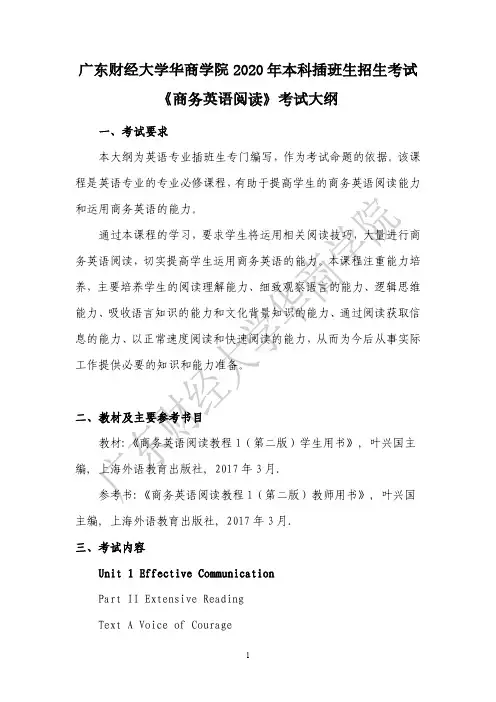
广东财经大学华商学院2020年本科插班生招生考试《商务英语阅读》考试大纲一、考试要求本大纲为英语专业插班生专门编写,作为考试命题的依据。
该课程是英语专业的专业必修课程,有助于提高学生的商务英语阅读能力和运用商务英语的能力。
通过本课程的学习,要求学生将运用相关阅读技巧,大量进行商务英语阅读,切实提高学生运用商务英语的能力。
本课程注重能力培养,主要培养学生的阅读理解能力、细致观察语言的能力、逻辑思维能力、吸收语言知识的能力和文化背景知识的能力、通过阅读获取信息的能力、以正常速度阅读和快速阅读的能力,从而为今后从事实际工作提供必要的知识和能力准备。
二、教材及主要参考书目教材:《商务英语阅读教程1(第二版)学生用书》, 叶兴国主编, 上海外语教育出版社, 2017年3月.参考书:《商务英语阅读教程1(第二版)教师用书》, 叶兴国主编, 上海外语教育出版社, 2017年3月.三、考试内容Unit 1 Effective CommunicationPart II Extensive ReadingText A Voice of CourageText B Tell Stories to Strengthen Organizational Bonds Part IV Supplementary Reading: How to Make the Multicultural Work Force WorkPart V Test YourselfUnit 2 Soaring ChinaPart II Extensive ReadingText A Clicks to BrickText B Still Made in ChinaPart V Test YourselfUnit 4 Staff ManagementPart II Extensive ReadingText A Handle Your Men in the OfficeText B Seven Useful Lessons You Can Learn from a Bad Boss Part V Test YourselfUnit 5 Consumer BehaviorPart II Extensive ReadingText A The Rich Can Learn from the Poor about How to Be FrugalText B Here’s How to Crack the Code on Your Customers’BehaviorPart V Test YourselfUnit 7 Corporate Social ResponsibilityPart II Extensive ReadingText A What Businesses Owe the World; Then and NowText B Don’t Put People Before ProfitsPart V Test YourselfUnit 10 Out-of-the-box ThinkingPart II Extensive ReadingText A How Fast Can You Learn?Text B Student TeachersPart V Test YourselfUnit 11 Time ManagementPart II Extensive ReadingText A 20 Ways to Save 20 MinutesText B How Much Time Should CEOs Devote to Customers? Part IV Supplementary Reading: Time Management in the Age of Social MediaPart V Test YourselfUnit 12 Green BusinessPart II Extensive ReadingText A Succeeding as a “Green” BusinessText B The Wellness BoomPart V Test YourselfUnit 14 Ways of InvestmentPart II Extensive ReadingText A Ways to Keep More CashText B When Stocks Tank, Some Investors Stampede to Alpacas Part V Test YourselfUnit 16 Era of Big DataPart II Extensive ReadingText A The Second Age of ReasonText B Mass Individualism Makes Life Tough for Consumer Product GiantsPart V Test Yourself四、考试方式与试题类型1、考试方式:闭卷,时间为120分钟2、试题类型:单选题、判断题、填空题、翻译题3、试卷安排:(1)本大纲各章所提到的内容和考核目标都是考试内容。
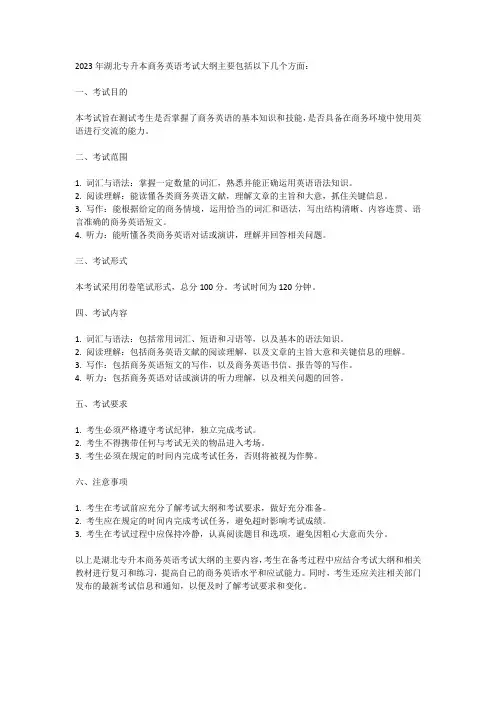
2023年湖北专升本商务英语考试大纲主要包括以下几个方面:一、考试目的本考试旨在测试考生是否掌握了商务英语的基本知识和技能,是否具备在商务环境中使用英语进行交流的能力。
二、考试范围1. 词汇与语法:掌握一定数量的词汇,熟悉并能正确运用英语语法知识。
2. 阅读理解:能读懂各类商务英语文献,理解文章的主旨和大意,抓住关键信息。
3. 写作:能根据给定的商务情境,运用恰当的词汇和语法,写出结构清晰、内容连贯、语言准确的商务英语短文。
4. 听力:能听懂各类商务英语对话或演讲,理解并回答相关问题。
三、考试形式本考试采用闭卷笔试形式,总分100分。
考试时间为120分钟。
四、考试内容1. 词汇与语法:包括常用词汇、短语和习语等,以及基本的语法知识。
2. 阅读理解:包括商务英语文献的阅读理解,以及文章的主旨大意和关键信息的理解。
3. 写作:包括商务英语短文的写作,以及商务英语书信、报告等的写作。
4. 听力:包括商务英语对话或演讲的听力理解,以及相关问题的回答。
五、考试要求1. 考生必须严格遵守考试纪律,独立完成考试。
2. 考生不得携带任何与考试无关的物品进入考场。
3. 考生必须在规定的时间内完成考试任务,否则将被视为作弊。
六、注意事项1. 考生在考试前应充分了解考试大纲和考试要求,做好充分准备。
2. 考生应在规定的时间内完成考试任务,避免超时影响考试成绩。
3. 考生在考试过程中应保持冷静,认真阅读题目和选项,避免因粗心大意而失分。
以上是湖北专升本商务英语考试大纲的主要内容,考生在备考过程中应结合考试大纲和相关教材进行复习和练习,提高自己的商务英语水平和应试能力。
同时,考生还应关注相关部门发布的最新考试信息和通知,以便及时了解考试要求和变化。
湖北省高等教育自学考试课程考试大纲课程名称:商务英语课程代码:00796第一部分课程性质与目标一、课程性质与特点商务英语是湖北省高等教育自学考试涉外秘书专业(独立本科段)的学位课程。
本课程从语言和商务两方面培养学生用英语商务沟通所必备的知识和技能,为学生今后从事商务活动、人际交往和职业发展进行有效交流打好基础。
二、课程目标与基本要求本课程的教学目的是培养学生掌握商务活动中的规范语言,并在学习商务规范语言的同时学到基本的商务知识。
本课程内容包括自我及他人介绍、职业描述、公司介绍等多个话题,并配有实用范例。
通过这些单元的学习,要求学生熟悉并掌握不同商务活动的规范语言、基本商务知识,并通过大量的案例练习,培养学生实际操作和运用能力。
本课程终结时,学生应达到如下要求:1. 熟练使用规范语言;2.掌握基本商务活动知识;3.在商务活动中熟练使用规范语言。
三、与本专业其他课程的关系商务英语课程与商务英语写作课程是紧密相连的。
商务英语写作课程重在写作形式,语言技能的提高,是本课程的基础。
本课程重在应用学生已有的英语语言知识、技能等,进行实际的商务活动。
通过学习本课程,学生的实际语言运用能力能够得到提高,且能为将来真正走入社会进行商务活动打下良好基础。
第二部分考核内容与考核目标第一单元介绍和问候一、学习目的与要求本单元学习,要求学生(1)能介绍自己和他人2)能问候及回应问候二、考核知识点与考核目标(一)介绍自己与他人(次重点)识记:常用介绍表达法,如:Excuse me, are you/is your name …?Hello, I’m/my name’s ….This is/I’d like to introduce ….Do you know/have you met….He/She is from….He/She works in….应用:1) Introduce yourself and others.2) Identify yourself and others.3) Ask and say where people are from.(二)问候与回应(一般)识记:问候与回应表达法,如:1)A. How are you?B. Fine, thanks./Not too bad, thank you.2)A. Nice to see you./Nice to talk to you.B. Nice to see you too/ It was nice talking to you, too.应用:Greet others.第二单元职业一、学习目的与要求本单元学习,要求学生(1)能问询或给出个人信息(姓名,职业等)(2)接电话和打电话(3) 记录电话等数字信息二、考核知识点与考核目标(一)听和说职业相关信息(重点)识记:1)表示职业的词汇,如:Professional and technical: lawyer…Administrative: executive…Clerical and office: receptionist…2)电话号码等数字的读法,如:320 112 three two oh double one two / three two zero one one two应用:1)Ask for and give personal and job-related information.2) Answer/get through on the phone and say telephone numbers.(二)请求提供/重复姓名拼写方式(一般)识记:表达法,如:Can you spell that, please?/How do you spell that?Can you repeat that, please?/Can you say that again, please?应用:Say letters and spell.第三单元公司一、学习目的与要求本单元学习,要求学生(1)描述公司情况(2)谈论不同类型的行业(3)找合作伙伴二、考核知识点与考核目标(一)询问/提供公司信息:公司名,总部,所在国与城市,分公司的数量和及产品(重点)识记:1)询问公司信息的方式,如:Who do you work for?Is that an American Company?Where are the headquarters?Do you have branches in Europe?2) 大洲、国名、城市名等专有名词,如:Europe…; America…; Seattle…应用:Ask for and give information on companies and products.(二)谈论不同类型的行业(次重点)识记:1)描述行业的表达法,如:Dentsu (公司或企业名) is in advertising/the advertising business.(行业)Coca-Cola(公司或企业名) makes/manufactures motor vehicles.(产品)2)提问行业信息的表达法,如:Does…(公司或企业名)make/manufacture…(产品)?Do … and …(两个或多个公司或企业名)make/manufacture…(产品)?What does …(公司或企业名) make/manufacture…(产品)?What do … and …(两个或多个公司或企业名) make/manufacture…(产品)?3)行业或产品相关的词汇,如:electronics, motor vehicles, financial services, chemicals, telecommunications,aerospace, airline, energy, engineering, travel and tourism, banking, insurance,advertising, catering, food, soft drinks, office equipment, computer…应用:1) Talk about types of business and products.2) Read company ads or mails to decide which company would be a good partner.3) Write a letter to some company about your company. Don’t forget the reader’saddress, your address and the date.第四单元工作地点一、学习目的与要求学习本单元,要求学生(1)指方向(2)谈论部门(3)记下信息二、考核知识点与考核目标(一)问询和指明方向(重点)识记:1)询问方向的表达法,如:Excuse me, where’s the conference room?Excuse me, I’m looking for the Purchasing manager’s office.2) 指明方向的表达法,如:Go up to the second floor and turn right.The canteen is the second door on the left.It’s opposite/next to the photocopying room.……3) 表示方位和部门的词汇,如:go down, Research and Development, Sales,After-sales, Reception, Dispatch, Purchasing, Accounts, Production, Canteen,Personnel, Marketing…应用:Ask for or give directions.(二)谈论部门(次重点)理解:不同部门的分工应用:Talk about departments.(三)记录信息(一般)识记:1)请求和某人说话的表达法,如:Can you put me through to Ms Taylor, please?Could I speak to Ms Taylor, please?2) 告诉某人不在或者忙碌,如:I’m afraid/sorry she’s not here at the moment. Can I take a message?I’m afraid/sorry he’s busy at the moment. Can I take a message?3)表达希望回话,如:Can you ask her/him to call me back?应用:Give and take telephone messages.第五单元复习和巩固一、学习目的与要求学习本节,要求学生(1)复习和巩固前4单元话题所用的表达法(2)复习巩固相关词汇(3)复习和巩固相关商务知识二、考核知识点与考核目标(一)四单元相关话题常用表达法和词汇(二)相关话题阅读和听力理解(三)语法:数字表达,方位介词用法第六单元日常工作一、学习目的与要求本单元学习,要求学生(1)谈论个人工作(2)描述常规工作(3)描述工作相关的喜好二、考核知识点与考核目标(一)询问和提供日常工作信息:活动、时间、环境(重点)识记:1) 询问工作时间的表达,如:What time do you start work? When do you finish work?When’s the lunch break? Do you work on Saturdays?Do you have other breaks? When do you take your holidays?2) 向新同事介绍工作时间的信件,如:Dear…(开头)Welcome to our company. Let me tell you about our routine:We start work at…(结尾)If you have any further questions, please contact me.Yours sincerely3)描述日常工作的词汇及表达,如:meet customers, go on trips; entertain visitors, write reports, use English; work late,make phone calls (in English), work with a computer, work on my own…I go on trips once/twice/three times a day/week/month/year.应用:1) Ask for and give information on working routines.2) Write a short letter to sb to describe the working routine.3)Write a short passage about a typical day in your life.(二)对工作环境等的喜好(次重点)识记:表示喜好的表达,如:I like/enjoy talking to people/going to conferences.I don’t mind working shifts.I don’t like/hate going to meetings/writing reports.应用:Express likes and dislikes.(三)动词+-ing形式做宾语(一般)识记:enjoy, mind, hate等+-ing形式做宾语第七单元工作环境一、学习目的与要求本单元学习,要求学生(1)请求和回应请求(2)讨论工作压力(3)提供建议二、考核知识点与考核目标(一)提出请求和作出回应(重点)识记:相关表达法,如:Could/Would you make me a copy of this report?Yes, sure. /Of course./No problem./Ok./I’d rather not./I’m rather busy.应用:Make and respond to requests(二)谈论责任、压力并给出建议(次重点)识记:1)表示责任和义务的表达法,如:An engineer has to/must/doesn’t have to/needn’t do overtime/work long hours/travel a lot/make decisions/meet deadlines/prepare reports/go to conferences….2) 给出建议的表达法,如:Stop smoking./ Don’t smoke.Why don’t you go on holiday?/ You shouldn’t work so hard. /You should relax.应用:Talk about obligation,stress and give advice.(三) 语法:情态动词的用法(一般)识记并理解:could, would等情态动词的用法第八单元计划一、学习目的与要求本单元学习,要求学生(1)讨论安排(2)作出安排(3)计划旅行二、考核知识点与考核目标(一)讨论计划和作出安排(重点)识记:1)讨论安排的表达法,如:I’m leaving on Sunday night.He’s meeting me at the airport on Monday afternoon.We’re inspecting the factory in the morning.2) 商安排的表达法,如:I’d like to arrange a meeting.Are you free on Tuesday?/Does Tuesday suit you?I’m afraid I’m visiting the factory/I have to visit the factory in the morning.What/How about the afternoon?3) 相关商务活动词汇,如:attend the trade fair, have a dinner with, meet new agent; fly to…; stay …应用:1) Make plans and arrangements.2) Plan a trip(write an Itinerary, or a letter to sb) based on documents like letters,memos or phone call.第九单元访问和旅行一、学习目的与要求学习本单元,要求学生(1)找旅馆(2)和来访者谈话(3)参加过的商务活动二、考核知识点与考核目标(一)找到合适旅馆(重点)识记:1) 询问旅馆信息的表达法,如:What are the business facilities like?What’s the service like?Is there a shopping centre in the hotel?Is the hotel equipped for business travelers?2)表示住宿相关的词汇,如:accommodation…应用:1) Write a letter asking for information about hotels.2) Write a fax to a hotel to book a room.(二)和来访者谈话(次重点)识记;1)与来访者谈论的话题和表达,如:Was the trin crowded?Did you have a good journey?Were you there on business?话题如:weather, hotel…应用:Welcome visitors and make small talk.(三)谈论参加过的商务活动(一般)识记:1)商务活动相关词汇,如:seminar, trade fair, conference, meeting, exhibition, training course2) 谈论参加商务活动的经历,如:A: How was the fair? B: We didn’t make any new contacts. It was…/We were very pleased. I think it was…A: Was it a good conference? B: Yes, it was. I think it was….A: What was the course like? B: It was very hard work. It was….A: Did you enjoy the seminar? B: We didn’t learn anything new. It wasn’t very..../I learnt a lot.应用:Describe business events.第十单元复习和巩固一、学习目的与要求学习本节,要求学生(1)复习和巩固前4单元话题所用的表达法(2)复习巩固相关词汇(3)复习和巩固相关商务知识二、考核知识点与考核目标(一)四单元相关话题常用表达法和词汇(二)相关话题阅读和听力理解(三)语法:时间介词搭配,情态动词,现在进行时表将来意义,简单过去式第十一单元工作经历一、学习目的与要求本单元学习,要求学生(1)帮别人找工作(2)谈论你的工作(3)描述你的第一份工作二、考核知识点与考核目标(一)帮人找工作(重点)识记:帮人找工作信件写法,如:Dear …(开头)I would like to know if you can help me. A friend of mine… is planning togo to New York for a year and is looking for a job.This is his/her background:(结尾)I would be grateful if you could help in this matter.Best wishes.理解:背景介绍一般包括:Education and qualification, experience, other information such as languages, future plans…应用:1) Write a letter to your friend to ask if he/she can help find sb a job.2) Interview some candidates for a job advertised. Read their CVs, ask questions.Make notes and decide who seems to be the best of the job.(二)描述工作和经历(次重点)识记:1)询问工作经历的表达,如:Who did you work for?What did you do?Did you have to work hard?How much holiday did you get?Did you enjoy your job?2)发表看法,给出原因的表达,如:I didn’t enjoy/like the job because it was boring./I had to travel too much.I liked/enjoyed the job because it paid well./I worked with nice people.应用:1) Describe career(including any holiday or part-time jobs) with friends including: education and qualification, training, work,experience, other information (such aslanguages, future plans). Don’t forget to take notes.2) Talk about your first job and express your attitude and feeling.第十二单元交易会和销售一、学习目的与要求本单元学习,要求学生(1)了解交易会(2)谈论产品(3)接受和下订单二、考核知识点与考核目标(一)了解交易会,描述产品(重点)识记:1)交易会相关的词汇,如:Furniture Show, Electronics Spring Show, Cycle Show, Sporting Goods Show, Giftand Stationery Show, Automobile/Motorcycle Parts and Accessories Show; FoodShow, Packaging Industry Show, Telecommunications Show, Textile and ApparelShow, Toy Show; Electronics Show, Medical Equipment and PharmaceuticalShow…2) 询问和描述产品信息,如:What are its special features?How much is it?/What’s the retail price?Can they give us a discount? When can they deliver?This is our standard model. (描述)It costs $300.It’s suitable for all occasions.We can deliver from stock.It’s available in red and in large, medium and small.We can offer a discount of 5%.应用:1)Book some accommodation for the International Cycle show.2) Help your friend find out about a product and decide which to buy.(二)下订单(次重点)应用:1) Practise asking about prices, discounts and delivery times.2) Use information on the order form to complete a fax..第十三单元产品描述一、学习目的与要求本单元学习,要求学生(1)比较产品(2)确定最好的产品(3)给出建议二、考核知识点与考核目标(一)比较商品(重点)识记:1)比较的表达法,如:A is cheaper than B.A has a longer warranty than B.A has a shorter delivery time than B.A has better technical support than B.A has a longer money-back guarantee.A has the cheapest/most expensive/highest/lowest price.A has the shortest delivery time.…..2) 相关词汇,如:warranty, money-back guarantee, installation, delivery time,technical support,on-site service, maintenance, contract, price…应用:1) Write a short advertisement for one of your products.2) Compare products based on advertisements.(二)给出建议(次重点)识记:1)给出建议的表达法,如:Let’s buy some new chairs.We could /I think we should have a coffee machine.2)办公用品相关词汇,如:desk, coffee machine, typewriter, notice board…应用:Your company is moving to new offices. Discuss and decide what to buy to equip an office.第十四单元宴请一、学习目的与要求学习本单元,要求学生(1)请客(2)发出邀请(3)描述食品二、考核知识点与考核目标(一)请客(重点)理解:Social customs in business and entertaining guests.应用:Read about social skills and cultural awareness in business and entertaining guests and compare your own culture.(二)发出邀请(次重点)识记:1)邀请相关表达,如:A: Would you like to have lunch next week?I’d like to invite you to dinner next Thursday.B. That sounds nice/That’s very kind of you. When exactly?A. How about Tuesday?/ Is Friday convenient?B. I’m afraid/Unfortunately, I’ve got to to go Head Office. I can’t make that day…A: That’s a pity. Does Wednesday suit you?/How about Friday at 12:30?B: Yes that’s fine/I’m free then. I’ll look forward to it.应用:1)Make and accept or decline invitations.2) Take a business associate to dinner.(三)描述食品(一般)识记:1)食品相关的词汇,如:a starter, a main course, a dessert, aubergine, avocado, soup…2) 描述食品的词汇,如:It’s a local speciality/very popular here/a kind of vegetable….I t’s fairly hot/quite rich/very sweet/salty/spicy/sour/fresh/bitter.It’s (a bit) like…应用:Plan a menu for important customers and explain your menu to someone from another group. Your menu should have a starter, a main course and a dessert.第十五单元复习和巩固一、学习目的与要求学习本节,要求学生(1)复习和巩固前4单元话题所用的表达法(2)复习巩固相关词汇(3)复习和巩固相关商务知识二、考核知识点与考核目标(一)四单元相关话题常用表达法和词汇(二)相关话题阅读和听力理解(三)语法:比较级与最高级第十六单元公司和工厂一、学习目的与要求本单元学习,要求学生(1)描述你已经完成的工作(2)参观工厂(3)公司报告二、考核知识点与考核目标(一)描述你已经完成的事情(次重点)识记:1) 提问和回答关于事情完成情况的表达,如:Have you done…? Yes, I’ve (have) done….Have you had lunch yet? No, I was/’ve been too busy.2) 工作相关的词汇,如:explain the agenda, arrange a meeting, show sb around;read the financial report…(二)参观工厂,阅读公司报告(重点)识记:1)参观工厂,提出警告的表达法,如:Watch out! Please be careful! Stand back, please!You have to pay attention…. Stop! Don’t’ touch that! Get back.It’s important not to touch the machinery.It’s a safety requirement to wear them….应用:Arrange a day’s programme for a visitor: which departments you will show and safety requirement.(三) 公司报告(一般)理解:读或听有关公司的材料,理解公司各部门的职责。
2020年华南农业大学珠江学院本科插班生招生考试《商务英语阅读》考试大纲一、考试性质普通高等学校本科插班生(又称专插本)招生考试是由专科毕业生参加的选拔性考试。
高等学校根据考生的成绩,按照已确定的招生计划,德、智、体全面衡量,择优录取。
因此,本科插班生考试应有较高信度、效度、必要的区分度和适当的难度。
二、主要参考书《商务英语阅读》,叶兴国、2017-03-01上海外语教育出版社、ISBN:978-7-5446-4515-7三、考试内容Unit 1 Effective CommunicationPart I Pre-reading QuestionsPart II Extensive ReadingText A V oice of CourageText B Tell Stories to Strengthen Organizational BondsPart HI Reading SkillsPart IV Supplementary Reading:How to Make the Multicultural Work Force WorkPart V Test YourselfUnit 2 Soaring ChinaPart I Pre-reading QuestionsPart II Extensive ReadingText A Clicks to BrickText B Still Made in ChinaPart III Reading SkillsPart IV Supplementary Reading:Divergence Seen in Chinese Companies' DevelopmentPart V Test YourselfUnit 3 Gender DiscrepancyPart I Pre-reading QuestionsPart II Extensive.ReadingText A Home Truths about Working FamiliesText B The Weaker SexPart III Reading SkillsPart IV Supplementary Reading:Humor MePart V Test YourselfUnit 4 Staff ManagementPart I Pre-reading QuestionsPart II Extensive ReadingText A Handle Your Men in the OfficeText B Seven Useful Lessons You Can Learn from a Bad BossPart III Reading SkillsPart IV Supplementary Reading:The New International Style of Management Part V Test YourselfUnit 5 Consumer BehaviorPart I Pre-reading QuestionsPart II Extensive ReadingText A The Rich Can Learn from the Poor about How to Be FrugalText B Here's How to Crack the Code on Your Customers' BehaviorPart III Reading SkillsPart IV Supplementary Reading:How Consumers Rewrote the Old Recessionary RulesPart V Test YourselfUnit 6 Marriage IssuesPart I Pre-reading QuestionsPart II Extensive ReadingText A Three Views of MarriageText B Married,with MoneyPart III Reading SkillsPart IV Supplementary Reading:Yours,Mine & MinePart V Test YourselfUnit 7 Corporate Social ResponsibilityPart I Pre-reading QuestionsPart II Extensive ReadingText A What Businesses Owe the World:Then and NowText B Don't Put People Before ProfitsPart III Reading SkillsPart IV Supplementary Reading:Social Saints,Fiscal Fiends Part V Test YourselfUnit 8 Career SuccessPart I Pre-reading QuestionsPart II Extensive ReadingText A Brain-twisting Job Interview Questions by Microsoft Text B It's Time for a Brand New YouPart III Reading SkillsPart IV Supplementary Reading:Why Can't You Find a Job?Part V Test YourselfUnit 9 Positive AttitudesPart I Pre-reading QuestionsPart II Extensive ReadingText A Be Happy 'Cause I Choose HappinessText B If You Fire People,Don't Be a Jerk about ItPart III Reading SkillsPart IV Supplementary Reading:Positive ThinkersPart V Test YourselfUnit 10 Out-of-the-box ThinkingPart I Pre-reading QuestionsPart II Extensive ReadingText A How Fast Can You Learn?Text B Student TeachersPart III Reading SkillsPart IV Supplementary Reading:Got ideas?Part V Test YourselfUnit 11 Time ManagementPart I Pre-reading QuestionsPart II Extensive ReadingText A 20 Ways to Save 20 MinutesText B How Much Time Should CEOs Devote to Customers?Part III Reading SkillsPart IV Supplementary Reading:Time Management in the Age of Social Media Part V Test YourselfUnit 12 Green BusinessPart I Pre-reading QuestionsPart II Extensive ReadingText A Succeeding as a "Green" BusinessText B The Wellness BoomPart III Reading SkillsPart IV Supplementary Reading:Recycle,Reuse,Reprofit:Startups Try to Make Money Selling Your StuffPart V Test YourselfUnit 13 Honesty IssuesPart I Pre-reading QuestionsPart II Extensive ReadingText A In Search of HonestyText B 5 Ways to Spot a LiarPart III Reading SkillsPart IV Supplementary Reading:Slasher AttackPart V Test YourselfUnit 14 Ways of InvestmentPart I Pre-reading QuestionsPart II Extensive ReadingText A Ways to Keep More CashText B When Stocks Tank,Some Investors Stampedeto AlpacasPart III Reading SkillsPart IV Supplementary Reading:Get the Right Coverage Part V Test YourselfUnit 15 Retirement PlanningPart I Pre-reading QuestionsPart II Extensive ReadingText A How Long Will You Live?Text B Plan Ahead to Beat Retirement BluesPart III Reading SkillsPart IV Supplementary Reading:Over 60 and OverlookedPart V Test YourselfUnit 16 Era of Big DataPart I Pre-reading QuestionsPart II Extensive ReadingText A The Second Age of ReasonText B Mass Individualism Makes Life Tough forConsumer Product GiantsPart III Reading SkillsPart IV Supplementary Reading:Computer Chips and DipPart V Test Yourself四、考核形式(一)考核方法考核类型:闭卷考核方式:笔试考核时间:120分钟(二)成绩评定实行百分制,满分:100分。
商务英语阅读自考大纲-CAL-FENGHAI.-(YICAI)-Company One1Ⅰ、课程性质及其设置的目的和要求一、本课程的性质与设置的目的“商务英语阅读”是高等教育自学考试商务英语专业(独立本科段)的选考课,占 6 学分。
本课程的目的在于培养考生的商务英语阅读能力和提高学生的阅读速度,培养学生细致观察商务英语的能力以及假设、分析归纳、推理检验等逻辑思维能力,扩大学生的商务英语词汇量和经贸知识,向学生提供内容广泛、原汁原味的商务英语文章,以扩大学生的知识面,增强学生的商务英语语感和培养学生阅读未经删节或简写的权威外刊的兴趣与能力,使他们了解商务英语在词汇、语法和篇章等方面的特点,并增长和积累经贸知识,从而打好语言和专业两方面的基础。
二、本课程的基本要求本课程的基本要求是:掌握西方商务报刊英语文章的常用词汇、常用句型,熟悉各种主要商务英语文章类型,掌握阅读和理解商务英语文章的基本技能,提高阅读商务文章,获取商务信息的基本能力,并进一步提高商务英语读、写、译的能力,学会商务报刊文章中最常用的表达方法的实际运用。
三、与相关课程的联系“商务英语阅读”课程的先修课程是英语专业专科基础英语课程。
其他专业课程,如“进出口英语函电”、“外贸英语会话”、“外经贸应用文”等与本课程密切相关。
1Ⅱ、课程内容与考核目标第一单元教育一.学习目的和要求(一)介绍西方报刊杂志中关于教育方面的报道和论述,使学生学习并了解这类文章的文体、语言和内容特点。
(二)使学生掌握有关词语、句子结构和篇章表达的语言知识。
二、考核知识点和考核要求(一)词汇基础(1)掌握课文中出现的普通词汇含义及其用法:1. disembark v. 2. chuckle v. 3. inequality n. 4. meritocracy n. 5. marvel v. 6. relish v. 7. dopey adj. 8. intuition n. 9. eclipse n. 10. frenzy n. 11. celebrity n. 12. briefing n. 13. eternity n. 14. train depot n. 15. cadre n. 16. friction n. 17. meddle v. 18. journalism n. 19. rebuff v. 20. accost v. 21. quantify v. 22. avalanche n. 23. hierarchy n. 24. notorious adj. 25. drop out v. 26. wayward adj. 下船,下飞机咯咯地笑不平等精英管理的社会觉得惊奇从……得到乐趣,喜爱笨的,迟钝的直觉(日、月)蚀疯狂名人简报,(新闻)发布会永久火车站核心班子,骨干队伍摩擦管闲事新闻学回绝打招呼,搭话量化雪崩,大量的等级制度声名狼藉的中途退学任性的27. permanent adj. 永久的28. rational adj. 29. recruit v. 30. affinity n. 理性的,明智的招收亲和力22. 3. 4. 5. 6. 7. 9.31. credential n. 32. reminisce v. 33. phobia n. 34. perimeter n. 证书,证明 回忆 恐惧症 周界,周长 35. commercialised adj. 商业化的 36. shrink v. 37. enrolment n. 38. vigorous adj. 39. momentum n. 40. squeeze v. 41. intrigue v. 42. dilemma n. 43. elite n. 44. lavish adj. 45. gleefully adv. 萎缩 注册 活跃的 发展势头 挤堵 吸引,激起兴趣 困境 精英 丰富的 愉快地 46. renunciation n. 摒弃 (2)掌握课文中的专业术语,能够准确进行中英文互译: 1. the Federal Reserve Board (美国)联邦储备委员会 stockbroker 股票经纪人 financial consulting company 财政咨询公司 the Council of Economic Advisers 总统经济顾问委员会 mathematical economics 数理经济学 business forecaster 商情预测员 econometrician 计量经济学家 8. profit margin revenue 利润率 财政收入 (二)掌握课文中的句式 (1)能够准确理解课文中有关商务英语的常用句子结构和意义; (2)能够准确翻译与这些句式相关的句子。
湖北省高等教育自学考试课程考试大纲课程名称:商务英语阅读课程代码:05439第一部分课程性质与目标一、课程性质与特点商务英语阅读课程是湖北省高等教育自学考试商务英语(专科)的一门专业基础课。
本课程以当代英语国家的原版教材、英语报纸、杂志和学术刊物中与经济和商务有关的文章为基础,材料内容涉及商贸英语的主要领域,如经济学、国际贸易、市场营销、企业管理、投资、证券、保险、广告等。
本课程是一门理论联系实际,应用性较强的课程。
二、课程目标与基本要求通过本课程的学习,学生既可学到地道的英语(包括大量的专业术语),又可以学到对外经济贸易知识,同时也能够掌握商务报刊文章的基本特点,提高阅读和分析能力,最终从整体上提高商贸英语语言水平以及语言欣赏和运用能力,达到商务英语专业专科生水平。
三、与本专业其他课程的关系商务英语阅读课程与商务英语口语、综合英语等课程同属于专业基础课,是商务英语写作、商务英语翻译、商务英语函电等课程的先修课程。
第二部分考核内容与考核目标第一单元财经一、学习目的与要求通过本单元学习,认知商贸英语文章的内在逻辑关系,帮助学生提高第 1 页阅读理解的能力,了解国际财经概况。
二、考核知识点与考核目标(一)课内训练(重点)识记:1. When Banker’s Bets Go Bad银行家的猜测落空名词解释:OCC: Office of the Comptroller of the Currency 通货监理局Alan Greenspan 艾伦·格林斯潘,美联储主席句子翻译:1)The bank had doubled profits in the past year viaa string of successful mergers, but on Apr. 21 itreported that its securities portfolio hadunrealized losses of nearly $131 million.2)We’re considering strategies that make the mostsense if rates are going up much more aggressivelyand sooner than anticipated.2. Creating Government Financing Programs for Small andMedium-sized Enterprises in China中国为中小型企业提供政府财政援助项目名词解释:Labor-intensive 劳动密集型SME: small and medium-sized enterprise 中小型企业SOE: state-owned enterprises 国有企业句子翻译:In China, as a result of the economic reforms and market opening measures, SMEs have enjoyed remarkabledevelopment and have grown to become an important forcein contributing towards sustained and rapid growth ofthe Chinese economic.(二)阅读技巧(次重点)应用:阅读的逻辑技巧(三)课外练习(一般)理解:1.Carlyle Group’s As ian Invasion加雷集团的亚洲扩张名词解释:Venture-capital 风险资本Carlyle Group 凯雷投资集团Citigroup 花旗集团2. Why the Dollar Is Blooming Again为什么美元再次复兴?名词解释:Greenback 美元(俚语)第 3 页Lehman Brothers Inc 雷曼兄弟公司European Central Bank 欧洲中央银行Federal Reserve Bank 美国联邦储备银行(四)拓展阅读(一般)理解:1. How Banks Pretty up the Profit Picture银行如何美化收益前景2. Thai Stocks What Goes Up泰国股市:到底是怎么了?3. Inventing to Order以市场为导向开发产品4. I t’s an Office Party in Hong Kong香港办公楼地价之争第二单元人力资源管理一、学习目的与要求通过本单元学习,掌握商务英语阅读中的快速阅读技巧,了解人力资源管理概况。
《商务英语阅读》1理论教学大纲(供四年制本科商务英语专业使用)I前言《商务英语阅读》是商务英语专业四年制本科专业必修主干课,贯穿两年四个学期。
掌握商务英语词汇以及在各种商务场合所使用的不通用语(行话)对商务工作人员是非常必要的。
因此,商务英语阅读课对商务英语专业的学生来说是非常重要的一门课。
学生可以通过该课的学习与练习来了解不同场合与领域的商务用语,提高英语沟通技能,使学生在未来的商务活动中能更自信,更流利,也更准确的使用英语辅助商务活动。
为了适应我院学生的实际水平,更好地提高教学质量,现制订商务英语专业商务英语阅读教学大纲如下:本大纲适用于四年制本科商务英语专业学生使用。
现将大纲使用中有关问题说明如下:一为了使教师和学生更好地掌握教材,大纲每一章节均由教学目的、教学要求和教学内容三部分组成。
教学目的注明教学目标,教学要求分掌握、熟悉和了解三个级别,教学内容与教学要求级别相对应,并统一标示(核心内容即知识点以下划实线,重点内容以下划虚线,一般内容不标示)便于学生重点学习。
二教师在保证大纲核心内容的前提下,可根据不同教学手段,讲授重点内容和介绍一般内容,有的内容可留给学生自学。
三总教学参考时数为144学时。
四教材:《商务英语阅读教程》(《BUSINESS ENGLISH: A READING COURSE》),叶兴国,上海外语教育出版社,1版,2010年8月。
II正文Unit 1 Enterprise M anagers一Teaching objectivesTo know different cultures’ influence on world economy二Teaching requirements(一)To be familiar with professional words.(二)To master common ground of multinational companies.(三)To know new international style of management.三Teaching contents(一)To learn traits of global corporate culture.(二)To study professional words and phrases.(三)To do exercises: translate sentences into ChineseUnit 2 Imaginative Talents一Teaching objectivesTo know how the advanced technology influence executives’ learning ability. 二Teaching requirements(一)To be familiar with the development of technology(二)To master professional words and phrases.(三)To know text organization of text b.三Teaching contents(一)To learn technological terms: WIFI, Wikis.(二)To study professional words and phrases.(三)To do exercises: answer the questions about this text.Unit 3 LayoffEmployees一Teaching objectivesTo understand how an employer layoff employees with dignity二Teaching requirements(一)To be familiar with professional words.(二)To master the skills to express regret over layoffs.(三)To know the way to keep employees’ self-esteem when they are fired. 三Teaching contents(一)To analyze what should an employer say when layoff an employee.(二)To study professional words and phrases.(三)To do exercises: fill in the blank with one of these phrases.Unit 4 Answer Interviewer's Questions 一Teaching objectivesTo understand how companies like Microsoft Corporation design puzzle questions. 二Teaching requirements(一)To be familiar with professional words.(二)To master the brain-tingling questions of Microsoft(三)To know the brain-twisting job interview of Microsoft.三Teaching contents(一)To learn different questions`6.(二)To study professional words and phrases.(三)To do exercises:.choose the best answer to the questionsUnit 5 Financial Management一Teaching objectivesTo know the ways to keep more cash.二Teaching requirements(一)To be familiar with professional words.(二)To master tips of losing less and holding on to more.(三)To know insurance assurance三Teaching contents(一)To learn different financial institutes.(二)To study professional words and phrases.(三)To do exercises: translate the following into Chinese.Unit 6Get Better Ideas一Teaching objectivesTo know the way managers use to get ideas from people to make better decisions 二Teaching requirements(一)To be familiar with professional words.(二)To master Ben Kaufman’s accomplishment.(三)To know the .三Teaching contents(一)To learn Ben Kaufman’s ideas.(二)To study professional words and phrases.(三)To do exercises: choose the right meaning of the underlined word.Unit 8How to Live一Teaching objectivesTo learn the plan for your life二Teaching requirements(一)To be familiar with professional words.(二)To master the retirement plan.(三)To know the way to calculate your lifespan.三Teaching contents(一)To learn life expectancy at your age.(二)To study professional words and phrases.(三)To do exercises: choose the best answer to questions.Unit 10Attitude一Teaching objectivesTo learn Jerry’s attitude to life.二Teaching requirements(一)To be familiar with professional words.(二)To ma ster Jerry’s attitude toward choose.(三)To know why Jerry is allergic to bullets.三Teaching contents(一)To learn the way business man attract customers.(二)To study what is Jerry’s choice..(三)To do exercises: fill in the blank of the sentences.III教学组织与方法一实施机构:由外国语学院商务英语教研室执行。
高等教育自学考试商务英语专业商务英语(二)自学考试大纲黑龙江大学应用外语学院目录编写前言编写说明一、课程性质和学习目的1、本课程的性质2、本课程设置的目的3、总体课程教学要求4、本课程与其它专业课程的关系5、学时安排二、自学考试大纲有关说明和实施要求1、考纲与教材关系2、考核目标3、命题原则4、学习要求5、自学教材6、自学方法7、社会助学8、网络支持9、本课程训练内容及方法三、课程内容和考核目标第一章工作方式与联络第二章公司福利与公司报告第三章创业与留言记录第四章广告和工作委任第五章工作地点和参与会议第六章招聘和电子邮件第七章销售与售货第八章培训和表现专注第九章品牌和接通电话第十章管理和解决问题第十一章道德的经济和讨论趋势第十二章商法和应对质疑编写前言为了适应社会主义现代化建设事业对培养人才的需要,我国在20世纪80年代初建立了高等教育自学考试制度,经过20多年的发展,高等教育自学考试已成为我国高等教育基本制度之一。
高等教育自学考试是个人自学,社会助学和国家考试相结合的一种新的高等教育形式,是我国高等教育体系的一个组成部分。
实行高等教育自学考试制度,是落实宪法规定的“鼓励自学成材”的重要措施,是提高中华民族思想道德和科学文化素质的需要,也是造就和提拔人才的一种途径。
应考者通过规定的考试课程并经思想品德鉴定达到毕业要求的,可以获得毕业证书,国家承认学历并按照规定享有与普通高等学校毕业生同等的有关待遇。
从80年代初期开始,各省、自治区、直辖市先后成立了高等教育自学考试委员会,开展了高等教育自学考试工作,为国家培养造就了大批专门人才。
为科学、合理地制定高等教育自学考试标准,提高教育质量,全国高等教育自学考试指导委员会(以下简称全国考委)组织各方面专家对高等教育自学考试专业设置进行了调整,统一了专业设置标准,全国考委陆续制定了几十个专业考试计划。
在此基础上,各专业委员会按照专业考试计划的要求,从造就和选拔人才的需要出发,编写了相应专业的课程自学考试大纲,进一步规定了课程学习和考试的内容与范围,有利于社会助学,使自学要求明确,考试标准规范化、具体化。
Ⅰ、课程性质及其设置的目的和要求一、本课程的性质与设置的目的―商务英语阅读‖是高等教育自学考试商务英语专业(独立本科段)的选考课,占6 学分。
本课程的目的在于培养考生的商务英语阅读能力和提高学生的阅读速度,培养学生细致观察商务英语的能力以及假设、分析归纳、推理检验等逻辑思维能力,扩大学生的商务英语词汇量和经贸知识,向学生提供内容广泛、原汁原味的商务英语文章,以扩大学生的知识面,增强学生的商务英语语感和培养学生阅读未经删节或简写的权威外刊的兴趣与能力,使他们了解商务英语在词汇、语法和篇章等方面的特点,并增长和积累经贸知识,从而打好语言和专业两方面的基础。
二、本课程的基本要求本课程的基本要求是:掌握西方商务报刊英语文章的常用词汇、常用句型,熟悉各种主要商务英语文章类型,掌握阅读和理解商务英语文章的基本技能,提高阅读商务文章,获取商务信息的基本能力,并进一步提高商务英语读、写、译的能力,学会商务报刊文章中最常用的表达方法的实际运用。
三、与相关课程的联系―商务英语阅读‖课程的先修课程是英语专业专科基础英语课程。
其他专业课程,如―进出口英语函电‖、―外贸英语会话‖、―外经贸应用文‖等与本课程密切相关。
1Ⅱ、课程内容与考核目标第一单元教育一.学习目的和要求(一)介绍西方报刊杂志中关于教育方面的报道和论述,使学生学习并了解这类文章的文体、语言和内容特点。
(二)使学生掌握有关词语、句子结构和篇章表达的语言知识。
二、考核知识点和考核要求(一)词汇基础(1)掌握课文中出现的普通词汇含义及其用法:1.disembark v. 2.chuckle v. 3.inequality n. 4.meritocracy n. 5.marvel v. 6.relish v. 7.dopey adj. 8.intuition n. 9.eclipse n. 10.frenzy n. 11.celebrity n. 12.briefing n. 13.eternity n. 14.train depot n. 15.cadre n. 16.friction n. 17.meddle v. 18.journalism n. 19.rebuff v. 20.accost v. 21.quantify v. 22.avalanche n. 23.hierarchy n. 24.notorious adj. 25.drop out v. 26.wayward adj. 下船,下飞机咯咯地笑不平等精英管理的社会觉得惊奇从……得到乐趣,喜爱笨的,迟钝的直觉(日、月)蚀疯狂名人简报,(新闻)发布会永久火车站核心班子,骨干队伍摩擦管闲事新闻学回绝打招呼,搭话量化雪崩,大量的等级制度声名狼藉的中途退学任性的27.permanent adj. 永久的28.rational adj. 29.recruit v. 30.affinity n. 理性的,明智的招收亲和力22. 3. 4. 5. 6. 7. 9.31. credential n. 32. reminisce v. 33. phobia n. 34. perimeter n. 证书,证明 回忆 恐惧症 周界,周长 35. commercialised adj. 商业化的 36. shrink v. 37. enrolment n. 38. vigorous adj. 39. momentum n. 40. squeeze v. 41. intrigue v. 42. dilemma n. 43. elite n. 44. lavish adj. 45. gleefully adv. 萎缩 注册 活跃的 发展势头 挤堵 吸引,激起兴趣 困境 精英 丰富的 愉快地 46. renunciation n. 摒弃 (2)掌握课文中的专业术语,能够准确进行中英文互译: 1. the Federal Reserve Board (美国)联邦储备委员会 stockbroker 股票经纪人 financial consulting company 财政咨询公司 the Council of Economic Advisers 总统经济顾问委员会 mathematical economics 数理经济学 business forecaster 商情预测员 econometrician 计量经济学家 8. profit margin revenue 利润率 财政收入 (二)掌握课文中的句式 (1)能够准确理解课文中有关商务英语的常用句子结构和意义; (2)能够准确翻译与这些句式相关的句子。
1.The magnetic needle behaved as if influenced by a hidden force field, rather than through a mechanical method of touch or contact. 2. He liked the fact that America, despite its inequalities of wealth and racial injustices, was more of a meritocracy than Europe 3. He gave in to her nagging that he smoked too much, and on Thanksgiving bet her that he would be able to abstain from his pipe until the New Year. 4. So it is not much of a stretch to see him as instinctively fearful of Greenspan. 5. What made this exercise memorable was the magazine‘s huge investment in economics and statistics, which generated an avalanche of data that went far beyond what the Commerce Department was then publishing. 6. So me time after Sandy‘s death I found myself reminiscing about all this with Hedley Donovan and mentioned his decision to resist hiring Alan33.4.6.7.8.9. Greenspan.7. So there‘s a good chance that if he had been offered the magazine job, hewould have declined it, which implies, in turn, that Fortune‘s failure tomake that job offer had no lasting impact on the American economy.8. Perhaps management education would beat off its critics moreeffectively if it went back to its beginnings, and got more corporatemanagers to teach.第二单元创造财富一、学习目的和要求(一)介绍西方报刊杂志中关于创造财富方面的报道和论述,使学生学习并了解这类文章的文体、语言和内容特点。
(二)使学生掌握有关词语、句子结构和篇章表达的语言知识。
二、考核知识点和考核要求(一)词汇基础(1)掌握课文中出现的普通词汇含义及其用法:1.2.5. buck n.drop off v.full-timer n.transcription n.scrapbooking n.美元减少专职工作人员抄写,誊写剪贴perk n.anonymous adj.demographic adj.archive n.10. proof n.11. showcase v.12. knack n.13. offbeat adj.14. entertainer n.15. county n.16. reptile n.17. hook v.18. cough up v.19. surcharge n.20. sucker n.21. revolt v.22. bold adj.23. waive v.24. levy v. 额外津贴匿名的与人口统计有关的存档文件样张突出展示诀窍不同寻常的演艺者郡,县爬行动物使(人)上当不情愿的给(某物)附加费易受骗的人反抗大胆的取消,放弃征收,征税41. 2. 3. 4. 5. 6. 7.25. lobby v.26. discretion n.27. savvy n.28. stump v.29. lousy adj.30. up-front adj.31. whopping adj.32. insane adj.33. issuer n.34. alacrity n.35. scorecard n.36. paltry adj.37. stash v.38. sneaky adj.39. subsidize v.游说 判断力,决定力 智慧,见识 惑,难倒 糟糕的,差劲的 预付的 巨大的,庞大的 疯狂的,过度的 发行者 敏捷,欣然 记分卡 微不足道的 藏,隐藏 鬼鬼祟祟的,卑鄙的 资助 40. stick in sb‘s cr aw v. 使某人生气41. saturated adj.42. clutter n.43. venue n.44. motif n.45. replica n.46. monument n.47. terrazzo n.48. tranquil adj.49. collaborative adj.50. proposition n.51. unleash v.52. molecule n.饱和的 混乱 集合地,发生地点 主题 复制品 纪念碑 磨石子地 安静的 合作的 建议,主张 释放 分子 (2)掌握课文中的专业术语,能够准确进行中英文互译:networkpromoteword processingbookkeepingvirtual assistant网络沟通 通过广告或做宣传活动促销 文字处理 簿记,记帐 虚拟助理 administrative support 行政支助online forum网上论坛 8. 9. direct salessubsidiary.直销 子公司 10. sign up11. site12. line13. unbundled14. bounce15. overdraft n. 签约参加工作,签约雇用 站点 系列商品 对……分别计价 开具(支票)遭银行拒付而被退回 透支,透支额5(二)掌握课文中的句式(1)能够准确理解课文中有关商务英语的常用句子结构和意义;(2)能够准确翻译与这些句式相关的句子。